

University Admission Application Letter (with Samples & PDFs)
I have listed sample templates to help you craft an effective and professional university admission application letter.
Also, I would like to point out that you can also download a PDF containing all the samples at the end of this post.
Successful Application Letter for University Admission
First, find the sample template for university admission application letter below.
To, The Admissions Committee, [Name of the University], [Address of the University], [City], [State], [Postal Code]
Subject: Application for Admission to [Name of the Course]
Respected Sir/Madam,
I, [Your Full Name], resident of [Your Address], am writing this letter to show my keen interest in applying for the [Name of the Course] at your esteemed university for the academic year [Year].
I have recently completed my [last educational qualification] from [Name of School/College] with an aggregate of [Your Percentage/CGPA], and I am eager to further my studies in the field of [Field of Study]. I believe that studying at [Name of the University] will provide me the right knowledge, skills, and exposure to excel in this field.
I am particularly drawn to the [Name of the Course] at [Name of the University] because of its reputation for providing high-quality education and its focus on practical learning. I am confident that this course will help me achieve my academic and career goals.
Enclosed with this letter are my mark sheets, certificates, and other required documents. I kindly request you to consider my application and provide me with an opportunity to prove my potential and contribute to the university.
I am looking forward to being a part of your esteemed institution and assure you that I will put in my best efforts in all my endeavours.
Thank you for considering my application. I am eager to hear from you soon.
Yours sincerely,
[Your Full Name] [Your Contact Information] [Your Email Address]
Below I have listed 5 different sample applications for “university admission application letter” that you will certainly find useful for specific scenarios:
Crafting a Persuasive University Application Letter to Showcase Leadership Skills

To, The Admissions Committee, [University Name], [University Address].
Subject: Application for Admission to [Desired Course Name]
I, [Your Full Name], a student of Class XII from [Your School Name], am writing to express my keen interest in applying for the [Desired Course Name] at your esteemed university. I believe that my strong leadership skills, coupled with my academic accomplishments, make me an ideal candidate for this course.
I have consistently excelled in my studies, but more importantly, I have taken the initiative to lead and guide my peers through various activities. As the Head Boy/Girl of my school, I’ve learned to inspire and motivate my fellow students, organize events, and address issues efficiently. These experiences have honed my leadership abilities and have taught me how to balance my academic commitments with extracurricular responsibilities.
I played a pivotal role in initiating a ‘Clean Campus Drive’ in my school, where I led a team of students to maintain cleanliness and fostered a sense of responsibility among them. This initiative not only improved the school environment but also instilled a sense of community and teamwork among the students.
Moreover, I represented my school at the [Local/State/National] Leadership Summit, where I had the opportunity to interact with other young leaders and share innovative ideas to improve our communities. This experience broadened my perspective and reinforced my desire to lead and make a difference.
If given the opportunity to join [University Name], I assure you that I will bring these leadership qualities to contribute positively to the university community. I am eager to leverage my experiences to participate actively in student-led initiatives and further develop my leadership skills.
I am confident that [University Name] is the perfect platform for me to grow not just acadically but also as a leader. I humbly request you to consider my application favorably. I look forward to the opportunity to be a part of your esteemed institution.
Thank you for considering my application.
Yours Sincerely, [Your Full Name], [Your Contact Information].
Writing a Compelling University Application Letter Highlighting Athletic Achievements

To, The Admissions Committee, [Name of the University], [Address of the University]
Subject: Application for Admission and Highlighting Athletic Achievements
I hope this letter finds you in the best of health and spirits. I am [Your Name], a student from [Your School Name], [Your City], intending to apply for the [Course Name] at your esteemed university.
Academically, I have consistently performed well, securing a GPA of [Your GPA] in the previous year. However, I am not just a diligent student in the classroom, but also a passionate sportsperson. I believe my athletic achievements will contribute to the vibrant sports culture at your university.
Over the last few years, I have been an active participant in athletics and have had the honour of representing my school at various district, state, and national level competitions. In the recent [Name of Sports Event], I clinched the gold medal in [Name of the Sport], making my school and family immensely proud. Additionally, I was also the recipient of the prestigious [Name of the Award] given for outstanding performance in sports.
My commitment to sports has not only honed my physical abilities but has also helped me develop leadership skills, team spirit, and resilience. I believe that these qualities will not only aid me in my academic pursuit but also contribute to the overall diversity and vitality of your university’s student community.
I am enthusiastic about bringing the same dedication and spirit to your esteemed university and contributing to its athletic teams. I am certain that the comprehensive education and diverse opportunities provided by your university will help me grow, both acadically and athletically.
I am hopeful that you will consider my application favourably. Thank you for considering my application. I am looking forward to the possibility of becoming a part of your prestigious university.
Yours sincerely, [Your Name] [Your Contact Information]
Articulating Academic Excellence in a University Admission Application Letter

The Dean of Admissions, [University Name], [University Address], [City], [State], [Pin Code]
Subject: Application for Admission
Dear Sir/Madam,
I, [Your Name], am writing this letter seeking admission to the [Course Name] course at your prestigious institution for the academic year [Year]. I have recently completed my [last academic degree/course] from [Your School/College Name] in [City, State].
I have always been passionate about [subject(s) related to the course], and I am confident that my academic achievements reflect this. I have consistently maintained a high academic standing in my schooling years, ranking in the top [percentage/rank] of my class. My teachers have commended me for my dedication and commitment to learning, which is evident from my grades and participation in various academic competitions.
Moreover, I have been an active participant in various extracurricular activities that have helped me develop a holistic understanding of the world. I have led [mention some leadership roles], worked on [mention any projects or initiatives], and engaged in [mention any community service or volunteer work]. These experiences have taught me the importance of teamwork, leadership, and responsibility, and have fuelled my desire to further my learning.
Your institution, with its exemplary faculty and state-of-the-art facilities, stands as the ideal platform for me to deepen my knowledge and broaden my horizon. I am particularly drawn to the [mention specific aspects of the course or university that attract you], and I am confident that these will provide the right environment to nurture my academic and personal growth.
I am committed to maintaining my academic excellence and contributing positively to the university community. I am hopeful that I will be given the opportunity to bring my passion, dedication, and academic prowess to your esteemed institution.
Thank you for considering my application. I look forward to the possibility of contributing to and learning from the [University Name] community.
Yours Sincerely, [Your Name] [Your Address] [City, State, Pin Code] [Email Address] [Phone Number]
Tailoring a University Application Letter to Highlight Community Service Experiences

The Admission Committee, [University Name], [University Address], [City, State, Zip Code]
I hope this letter finds you in good health. I am [Your Name], a student of [Your School Name], seeking admission to your esteemed university for the upcoming academic year.
I am writing this letter to express my keen interest in the [Course Name] program at your prestigious institution. I have always been intrigued by [Subject Name], and I am eager to explore this field under the guidance of the accomplished faculty at [University Name].
During my time at high school, I have actively participated in various community service programs that have not only enriched my life but have also enhanced my understanding of society and its needs. I was a part of the ‘Clean-Up Drive’ in my local community, where we focused on maintaining cleanliness and educating people about the importance of hygiene.
In addition, I volunteered in the ‘Joy of Giving’ initiative, aimed at providing essential supplies to underprivileged children. This experience truly humbled me and made me realize the value of giving back to society. I believe these experiences have shaped me as an individual and have taught me the importance of empathy, teamwork, and leadership.
I am certain that these experiences will enable me to contribute to the diverse community at [University Name]. I am eager to bring my commitment to service and dedication to learning to your campus, and I look forward to the possibility of contributing my skills and experiences to your distinguished institution.
Thank you for considering my application. I look forward to the possibility of discussing my application with you further.
Yours faithfully,
[Your Name] [Your Contact Information]
Penning a University Application Letter Expressing a Deep Passion for a Specific Field of Study

To, The Admissions Office, [University Name], [University Address],
Subject: Application for Admission in [Specific Field of Study]
I, [Your Full Name], a resident of [Your City Name], am writing this letter to express my deep interest in applying for the [Specific Field of Study] program at your esteemed university for the academic year [Year of Admission].
My passion for [Specific Field of Study] was kindled during my school years, when I found myself fascinated by [Mention something specific about the field that fascinated you]. Since then, my curiosity and interest in this field have only grown. I have spent countless hours learning and honing my skills, and now I aspire to take this passion forward and delve deeper into this field at a university level.
Your esteemed university, with its excellent faculty, state-of-the-art facilities, and a rich history of producing exceptional talent in the field of [Specific Field of Study], is my dream institution. I am especially drawn to the [mention a specific aspect/feature of the university’s program that appeals to you], which I believe would greatly enhance my learning experience and provide me with a holistic understanding of the subject.
I have consistently excelled in this field during my school years [mention any achievements, awards, or recognition received]. I am confident that my dedication, coupled with the guidance of the exceptional faculty at [University Name], will equip me with the necessary skills and knowledge to contribute positively to this field.
I assure you of my utmost commitment and dedication towards my studies, and I am eager to make the most of the opportunities offered at your prestigious institution. I am hopeful that you will consider my application favorably.
Thank you for considering my application. I am looking forward to the opportunity of being a part of [University Name].
Yours Sincerely,
[Your Full Name] [Your Contact Information]
How to Write University Admission Application Letter
Some writing tips to help you craft a better application:
- Start with your personal information including your full name, address, the date, and the recipient’s address.
- Open the letter with a formal salutation, addressing the admissions committee or specific admission officer, if known.
- Introduce yourself, your current educational status and the program you’re applying to.
- Describe your academic interests, why you chose this university, and how it aligns with your career goals.
- Highlight your academic achievements, extracurricular activities, and any relevant work or volunteer experience.
- Explain any gaps or anomalies in your academic record, if applicable.
- State how you could contribute to the university and its community.
- End with a strong closing statement expressing your enthusiasm and gratitude for being considered.
- Include a formal sign-off, your full name and signature.
- Proofread your letter multiple times for any grammatical errors, spelling mistakes or typos.
Related Topics:
- University Admission Application Fee Payment Slip
- Application for Address Change
- SBI Bank Address Change Application
View all topics →
I am sure you will get some insights from here on how to write “university admission application letter”. And to help further, you can also download all the above application samples as PDFs by clicking here .
And if you have any related queries, kindly feel free to let me know in the comments below.
Leave a Reply Cancel reply
Your email address will not be published. Required fields are marked *
Save my name, email, and website in this browser for the next time I comment.

Writing Cover Letters for University Applications [2023 Guide]
Applying to university can be a daunting experience, especially when it comes to crafting the perfect cover letter for your application. A well-written cover letter can be the deciding factor between getting accepted into your dream program or receiving a rejection letter. In this guide, we will explore the importance of a strong cover letter, its purpose, format, content, and provide tips and examples to help you craft a compelling cover letter for your university application.
A cover letter for a university application is an essential document that can make or break your chances of getting admitted to your dream program. The importance of a strong cover letter in the application process cannot be understated, as it serves to introduce you, showcase your achievements, and demonstrate your passion for the chosen program or course.
In this article, we will cover:
- The purpose of a cover letter for university applications
- The format and structure of a cover letter
- The content and elements of an effective cover letter
- Tips for writing a compelling cover letter
- Common cover letter mistakes to avoid
- Sample cover letters for university applications
By following the advice and guidance provided in this article, you will be well-equipped to create a cover letter that stands out from the competition and increases your chances of admission. So, let's dive in and learn how to craft the perfect cover letter for your university application!
Purpose of a Cover Letter for University Applications
The primary purpose of a cover letter is to introduce the applicant, showcase their achievements, and demonstrate their passion for the chosen program or course. A cover letter complements other application materials, such as your resume and transcripts, by highlighting your unique qualities and strengths that may not be evident in those documents.
An effective cover letter can also demonstrate your motivation and commitment to the program, which can influence the admissions committee's decision. For example, MIT's Career Advising & Professional Development office explains that a well-crafted cover letter can help set you apart from other applicants by providing context and a personal touch to your application.
Format and Structure of a Cover Letter
A proper format and structure are crucial for creating a professional and effective cover letter for a university application. A standard cover letter typically includes:
- Header (with your contact information and the date)
- Salutation (addressing the recipient)
- Introduction (capturing the reader's attention)
- Body (highlighting your qualifications, achievements, and passion)
- Conclusion (leaving a lasting impression)
- Complimentary close (e.g., "Sincerely," followed by your name)
Proper formatting, such as using an appropriate font, font size, and margin settings, is essential for creating a polished and professional appearance. Keep your language clear and concise, and make sure to proofread and edit your letter to ensure it is error-free.
Content and Elements of a Cover Letter
A successful cover letter for a university application should contain specific elements that demonstrate the applicant's qualifications, achievements, and passion for the program. These elements include:
- Addressing the letter to the appropriate recipient
- Crafting an engaging introduction that captures the reader's attention
- Including essential elements in the body of the letter, such as academic interests, extracurricular activities, and relevant experiences
- Writing a compelling conclusion that leaves a lasting impression
Tailoring the content to the specific university or program is crucial, as demonstrated by Seattle Pacific University's Career Services . They advise that telling stories about your skills and experiences that are relevant to the specific program can help make your cover letter more effective.
Tips for Writing an Effective Cover Letter
Following certain tips and best practices can significantly improve the quality and impact of a cover letter for a university application:
- Research the university and program before writing the letter to better understand their values and expectations.
- Showcase your unique qualities and strengths by providing specific examples and details.
- Use strong action verbs and avoid clichés or overused phrases, as suggested by Freesumes .
- Seek feedback from teachers, counselors, or peers to ensure your cover letter is polished and compelling.
- Revise and refine your letter until it accurately represents your passion and qualifications for the program.
Common Cover Letter Mistakes to Avoid
Avoiding common cover letter mistakes is essential for creating a strong and effective university application:
- Address the letter to the correct recipient to show your attention to detail and professionalism.
- Avoid using generic or overly broad language, which can make your letter less impactful.
- Submit a well-formatted and professional-looking letter to convey your seriousness and commitment.
- Refrain from including irrelevant or excessive information that distracts from your main strengths.
- Proofread and edit your letter to eliminate typos, grammatical errors, and other mistakes that can undermine its impact.
Sample Cover Letters for University Applications
Examining sample cover letters can provide valuable insights and inspiration for crafting a successful university application. We recommend:
- Analyzing high-quality sample cover letters for various university programs or courses
- Identifying the strengths and weaknesses of each sample
- Adapting the samples to your specific situation and application
- Using the samples as a starting point for creating your unique cover letter
- Remembering to tailor your letter to the specific university or program
With proper research, planning, and execution, a well-crafted cover letter can significantly enhance a university application and increase the chances of admission. By applying the tips and guidance provided in this article, you will be well-prepared to create a compelling cover letter that showcases your passion, achievements, and qualifications for your dream program.
As a final piece of advice, remember that persistence and dedication are key to success in the university application process. Keep refining your cover letter and learning from feedback until you have a polished and impactful document that truly represents you. Good luck on your university application journey!
College Application Cover Letter Examples
As a college instructor and communication expert with extensive nonfiction and educational writing experience, Mary shares tips and advice related to a wide variety of topics.
Learn about our Editorial Policy .
When you are applying for college admission, it's important to do everything possible to make sure your application really stands out. Sending a cover letter in support of your application materials can be a great way to capture admissions officers' attention in a positive way while also giving them a chance to learn a bit about your personality and unique circumstances.
Example Cover Letter Templates for College Applications
You can use a cover letter whether you are applying via the Common Application or if you are submitting an individual admission packet. Choose the sample letter below that best fits your needs and adjust it to convey key highlights of why you should be considered for admission. To access each letter, simply click the image. It will open as an editable PDF file that you can customize, save and print. This guide for Adobe printables can be of assistance if you need help with the documents.
- Examples of Successful Grant Proposals to Help You Secure Funding
- 10 Sample Email Messages to Announce a Baby at Work
- 19 Real World Break-Up Letter Examples to Give You Closure
Sample Cover Letter for College Application Packets
If you are submitting a school-specific applicant packet, include the letter with all of your other materials (such as your application form, essay, and application fee).
Example Cover Letter to Pair With the Common App
If you are using the Common App, also known as the Common Application, you may still want to send an individualized cover letter to the schools that you're most interested in attending. Consider sending your cover letter to each school's admissions representative at the same time you complete your Common App, or even a few days before.
Writing Your College Application Cover Letter
While the samples here are great starting points, you will need to adjust them to focus on your specific situation. You will need to include:
- Why you want to attend this particular school
- What your academic interests are
- How the school is a good fit for your academic interests and long-term goals
- How your background and future interests make you a great candidate to consider
- Any special connections you have to the school (i.e., do you have relatives who graduated from the school?)
- Details on how the other components of your application packet will be received
- A specific request to consider you for admission
- Details on how to contact you
Stand Out to College Admission Officers
A well-written cover letter can be a terrific add-on to your college application package. Not everyone will think to send this kind of document, so it just might help you stand out among the other applicants. Of course, a poorly written letter can have the opposite effect. So, be sure that your letter follows an appropriate business letter format, really presents you in a positive light, is well-written, and error-free .
Published In: Letters
Writing a College Application Letter (Samples & Examples)
Table of Contents
Writing a great college application letter can be one of the most challenging prose pages that one has to put together in their high school career. On the one hand, it is just but a simple single-page document, but on the other, how do you talk about the things you need to talk about without boring the reader? A well-written college application letter will give you an edge among the thousands of applicants sending in their applications for the same college. A well-drafted college application letter should highlight your academic achievements, extracurricular, athletic, and community service achievements that will help you stand out during the highly competitive selection process.
What is a College Application Letter?
A college application letter is a letter used in several academic applications that college students need to undergo. It is usually a requirement of the academic institution where the student is currently attending. The letter can also be used for other special functions that the applicant would like to undertake.
How to Write a Great College Application Letter
Read the instructions carefully.
It is said that starting an application letter is usually the most challenging part. You may think that it is redundant that we mention that you need to go through the instructions carefully, but with all the stress and excitement that characterizes this period, you need to be keen on this.
If you fail to follow the application guidelines, you may come off as someone who won’t follow simple instructions of the university’s program. The page and word count limits are usually included in the instructions for a reason, and you should be able to organize your submission by following the set guidelines.
Go through the instructions several times and gather your notes before creating an outline to organize your application letter and decide what message you would like to send.
Do some research
Before writing your application letter, it is important that you do some research about the institution and their preferred candidates. By doing so, you will be able to tailor your application to fit their preferences, thereby increasing your chances of being selected.
Include your contact information
When writing, make sure to include your contact details. Use your professional email and provide a phone number that is always active to not miss out on any important communications.
Confirm the recipient’s contact information
When doing your research, also make sure to find out the correct address to send your application. You don’t want to go through the trouble of drafting your application to send it to the wrong address. The contact information is usually included in the instructions, but if not included, you can check the college’s website or contact the institution directly to find out to whom you should address the letter.
Create a great subject line
To make sure that the recipient clearly understands your letter’s purpose immediately, they start reading it and explain it in a few words. For example, you can write something like “Application for an intern position at ABC college.”
If you are sending the letter via mail, make sure to include such wording in the subject line.
Introduce yourself
Start your application letter with a compelling introduction. Although great writing may be hard to achieve, it is always possible to do so if you are smart about it. Introduce yourself properly as this will determine if the reader continues to read your document or if they will throw it in the trash. The recipient will only spend a few minutes reviewing your essay, so you have to start your introduction with a great introduction about yourself that will keep them engaged.
Tell the recipient about your education
Since you are a recent graduate or student, your educational background is your key asset. Make sure to properly highlight this at the very beginning of your application letter. Tell the recipient what you studied along with where and when you will be graduating if applicable.
Explain why you are the best candidate
Colleges are always looking for authenticity and quality thinking, so you should not try to shape your application around ideas or phrases that people have used several times before, but base it on your genuine beliefs.
In one or two paragraphs, explain to the recipient why your education and skills make you the best candidate. If you have already gained any relevant experience through summer jobs or interviews, you can also mention it in your application.
Include a call to action
End your application letter with a call to action- ask the recipient for an interview and direct them to review read your portfolio or resume. You can also be proactive and inform the recipient that you will be following up with an email or with a call to schedule an interview.
Show gratitude
Conclude your application by expressing your gratitude to the recipient for their time and consideration. After finishing your letter, make sure to sign it professionally.
Check your grammar and spelling
Even though you can write conventionally, spelling and grammar still need to be correct. Go through your letter and make sure that it is free of any grammatical errors before submitting it.
What Should Be Included in Your Application Letter
Regardless of the recommended length, your college application letter should show evidence that you performed due diligence concerning the selected college. You don’t want to include any irrelevant information or that you “think” should be included. Conduct your research and lay down the facts. You can visit the college website and look at local news to find out what is happening on campus.
Sound structure
An application letter should be both formal and professional. Structure your application letter in business letter format, and include your contact information, your name, title, date, and address of the recipient. Also, make sure to use a proper salutation, e.g., “Dear Application Committee,” alternatively, if you already have their name and title, you can use “Dear (their last name)”
Even college application letters, although formal, can showcase a person’s personality, passion, and sense of humor. Just as college application essays are meant to add color to the applicant’s back and white representation, so too can the college application letter tell a little more about the applicant. Choosing a single area from your application on which t expound tells the recipient what you consider important.
College Connection
When writing your application, you should highlight how you see yourself fitting in on the college campus. Legacy students may speak to their family’s pride in their family’s rich history at the college. Others with political affiliations might refer to their intentions of becoming active student leaders. And athletes might talk about their previous high school success and how they expect to contribute to their college teams.
College Application Letter Samples
Every student wants to stand out and be chosen for a position at the college of their choice. With thousands of students sending in their application letters each day, you have to make sure that your letter is perfectly crafted to give you a competitive edge. This is where we come in! Our college application letter templates are simple, unique, and impressive, and they are beautifully crafted to help you stand out. Choose and download our free and premium templates to help you in your writing.
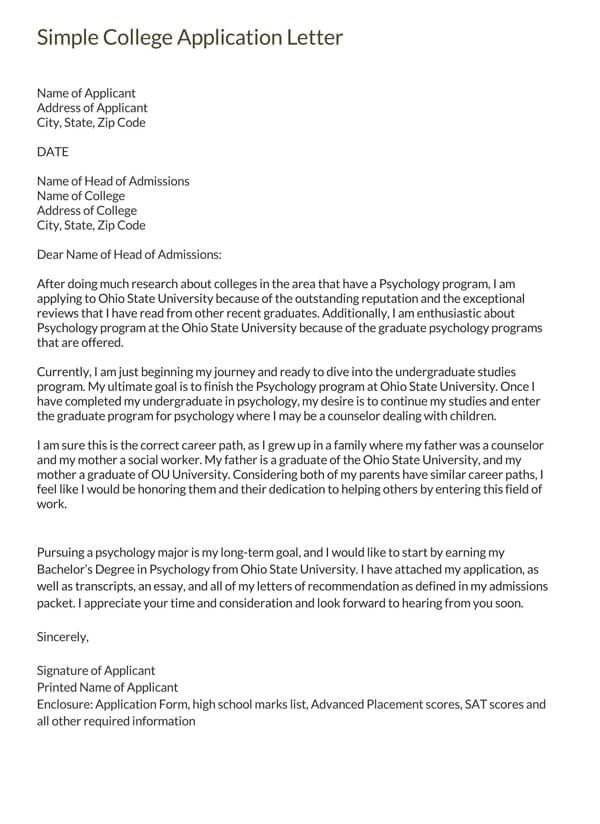
Your college application letter will serve as a shortcut through the pile of thousands of papers sent in by applicants each day. The letter is not a synopsis of your transcripts, nor is it a prompt of your resume. Rather, it is a cover letter that introduces you as an applicant and offers the recipient a glimpse into your potential fit at the college. Make sure that you are meticulous with your writing and that everything is as it should. You don’t want to send a letter that is half baked and expects to stand out. Take your time and draft a great letter. We wish you nothing but luck in your application.
Related Documents
How to Write an Application Letter for Admission Into a University
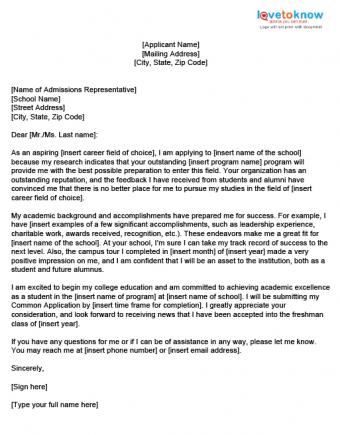
How to Write an Application Letter for Admission Into a University: College reputation and degree is in the palm of your hand. It is a rise or fall of your professional future. It is important that you choose the best college that suits your degree and academic record that you have.
When you write a letter or personal statement as part of applying for graduate or professional school, you make your case as much by the way you write as by what you say. Here are some qualities to aim for.
Table of Contents
Tips for writing an application request letter for admission
Be focussed : Take your cue first from the prompts given in the application form; also research the program widely, looking for hints about its values and identity. What is the main stated question (e.g., why you will be a good researcher or lawyer, what experience you can bring to the program, whether you can stand the pressure)? If the prompt is very general (or lacking), choose an overall point you want to make: that you are a proven achiever, that you thrive on challenges, that you have something special to contribute to the profession. . . . Don’t just write about law or medicine or anthropology: write about yourself as a lawyer, physician or anthropologist.
Be coherent : Being “together” is a quality of writing as well as of character. A clearly organized letter can create a picture of a clear-minded and sensible person. You might want to write from an outline or a diagram of main points. At least check the topic sentences of each paragraph in your finished piece to see if they make a logical sequence. Ask a tough-minded friend to give her impression.
Be interpretive : You need to make an impression concisely, so don’t use your letter just to repeat the facts set out in other parts of the application. Provide explicit answers for the question that arises in the mind of any reader looking at a hundred or more similar documents: “So what?” Use nouns and adjectives that name qualities (outgoing, curiosity, confident) and verbs that show action (coordinated, investigated, tried). Make an effort to find the exact right words to suit the evidence you are offering.
Be specific : There’s no point making claims unless you can back them up. Refer to the fact lists in other parts of your application (“as my academic record shows”), but offer enough examples so that your letter can stand on its own. Say that they are just instances, not your whole proof (“An incident from last summer is an example….”). The concrete language you use for these specific references will also balance the generalizing words of your interpretive points.
Be personal : Your letter substitutes for an interview. In effect, the readers have asked you to tell stories, mention details, expand on facts. So mention things you might not have put into the rest of the application—your ethnic background or political interests, even, if they’re relevant to your academic interests. Don’t be afraid to mention problems or weaknesses if you can show how you overcame them and what you learned from the experience. Use I rather than evasive phrases like “this writer” or “was experienced by me.” A stylistic tip: to avoid monotony, start some sentences with a subordinate clause such as “While I scrubbed floors” or “Because of my difficulties”—then go on to I did or I learned.
Options for Organizing an Admissions Letter
Judge by the clues on the application form and by the nature of the profession or discipline what kind of logical structure you could use to tie your points together into a coherent whole. You may see indications you are expected to demonstrate your personality, or be self-analytical, or enter into discussions in the discipline. You will probably use one or more of these standard expository patterns.
Narrative: A chronological order is easy to organize. It progresses from a beginning to an end, and you can divide up the middle into manageable sections. But beware of overworked openings like “I have always wanted to be a dentist,” and of excessive detail. Select relevant and interesting stories and make sure that the readers know why you are telling them.
Analytic: To deal with the central question why you are a good match for the program, give an overall answer about yourself and then discuss the elements that contribute to your engagement with the discipline. Discuss your interests in terms of key issues and theories in your discipline. To balance the dryness of this approach, break into memorable stories at times, using specific details, and use verbs to put yourself into action. Show what you intend to do after you have completed the program.
Technical: To indicate your research or professional interests, show your involvement with a specific issue. Don’t just outline the topic you want to work on; write about your summer research job or independent-study project, or even your program on student radio or your volunteer experience. Outline specific undergraduate projects as examples. Emphasize what you learned from these activities, and indicate how your studies will extend that learning.
- Common prompts include things like, “Outline your qualifications for this position” or “In writing, explain how this position would affect your career goals.” Sometimes, the prompt will be as short as, “Tell us something interesting about yourself.”
- If there is no prompt, but you still feel the need to introduce your application with a letter, it’s usually best to keep it as short as possible. Explain what you’re applying for, why you’re applying, and thank the contact for their consideration. That’s it.
- Often, college prompts will ask you to describe a time you struggled, or a time you overcame some obstacle. Write about something unique, a time that you actually failed and dealt with the consequences.
- The board will get thousands–literally, thousands–of letters about someone’s first mission trip, and letters about the time someone’s sports team was beaten, then overcame the odds, and won again. Avoid these topics.
- Be specific. If you’re writing to a college board, don’t say, “I want to go to this college because I need a degree.” That’s obvious. What do you want to do with it? Why? If you’re applying to a business, don’t say, “I just need a job.” That’s obvious. Why this specific job?
- Don’t include stuff that’s also on your resume. Your application letter is your one chance in an application to stand out. Listing off the number from your GPA and the boring list of achievements from your resume isn’t the best way to do that. The purpose of the letter is to get a sense of who you are, not a list of accomplishments. Don’t use the letter to describe the list of schools you’ve attended, your GPAs, and a list of extra-curricular activities, unless it relates to some anecdote in the letter. [7]
- If you’re applying to schools, what do you like about the school? What faculty are you interested in? Why this school, instead of another?
- Be sure to explain how you see yourself fitting into the campus—that’s what will really make you an ideal candidate for a school.
Application Request Letter for Admission Templates
When a student identifies a school they would like to enroll, they need to write a request for admission. Check out the application request letter for admission template and sample letters for guidance.
_____________
Date (date on which letter is written)
________________
Sub:_________________________________________
Dear _________________,
I hereby write to express my interest in the ____________ course at your university. I recently completed my degree in ____________ and I believe this course will complement my previous education. Your institution has a good reputation of combining class and practical based learning and this has motivated me to request for admission.
I am a quick learner and determined in my academics, this is evident from the ____________ enclosed herewith for your consideration. Taking this course is the stepping stone to achieve my career plans to work as a ____________. Additionally, I will acquire the knowledge and skills that I can practice in the work environment.
I wish to request the admission form, course details, and the fee structure for the course. Please send me the documents on my email ____________. Please give me an opportunity to pursue this course in your school and I assure you I will do my best.
I will highly appreciate a positive response.
Thank you.
Yours Sincerely,
(__________________)
The applications letter for university admission is one of the important documents that are required when applying for colleges. It should describe the applicant’s reasons for choosing the host school, his background, experiences, interests, and educational goals.
All Formats
20+ Sample College Application Letters – PDF, DOC
College application letters are used in various academic applications when college students request an entrance or transfer. It may be a requirement of the academic institution where they currently attend or it can also be used for special functions that the college or university student would like to undertake. Whether it’s nursing, engineering, architecture, accounting, or medical students, application letters are prominent in college enrollment processes.
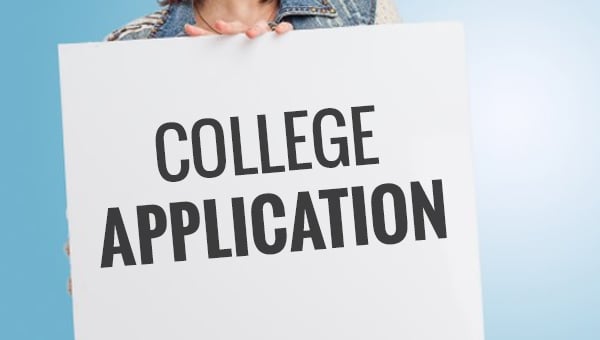
Free University Application Letter
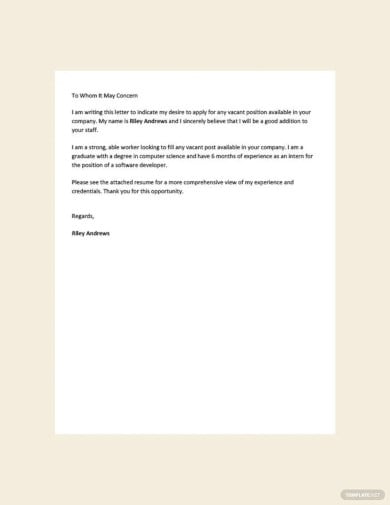
- Google Docs
- Apple Pages
University Application Letter Sample
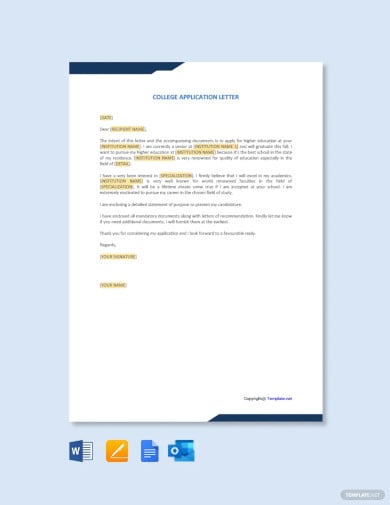
Application Letter For College Admission
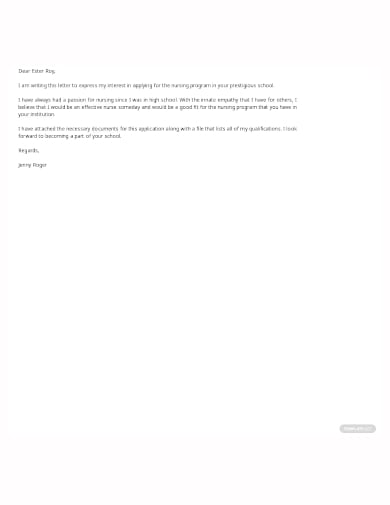
Application Format For University Students
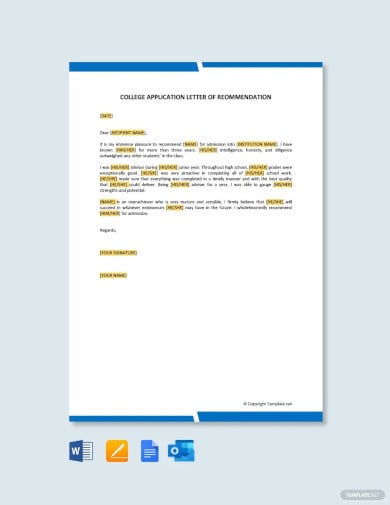
College Application Letter
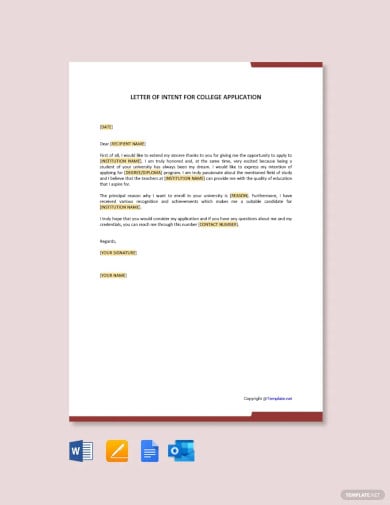
Example Of Application Letter For College Admission
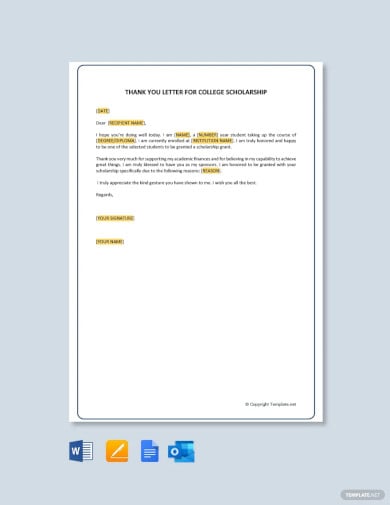
Eligibility Letter For University
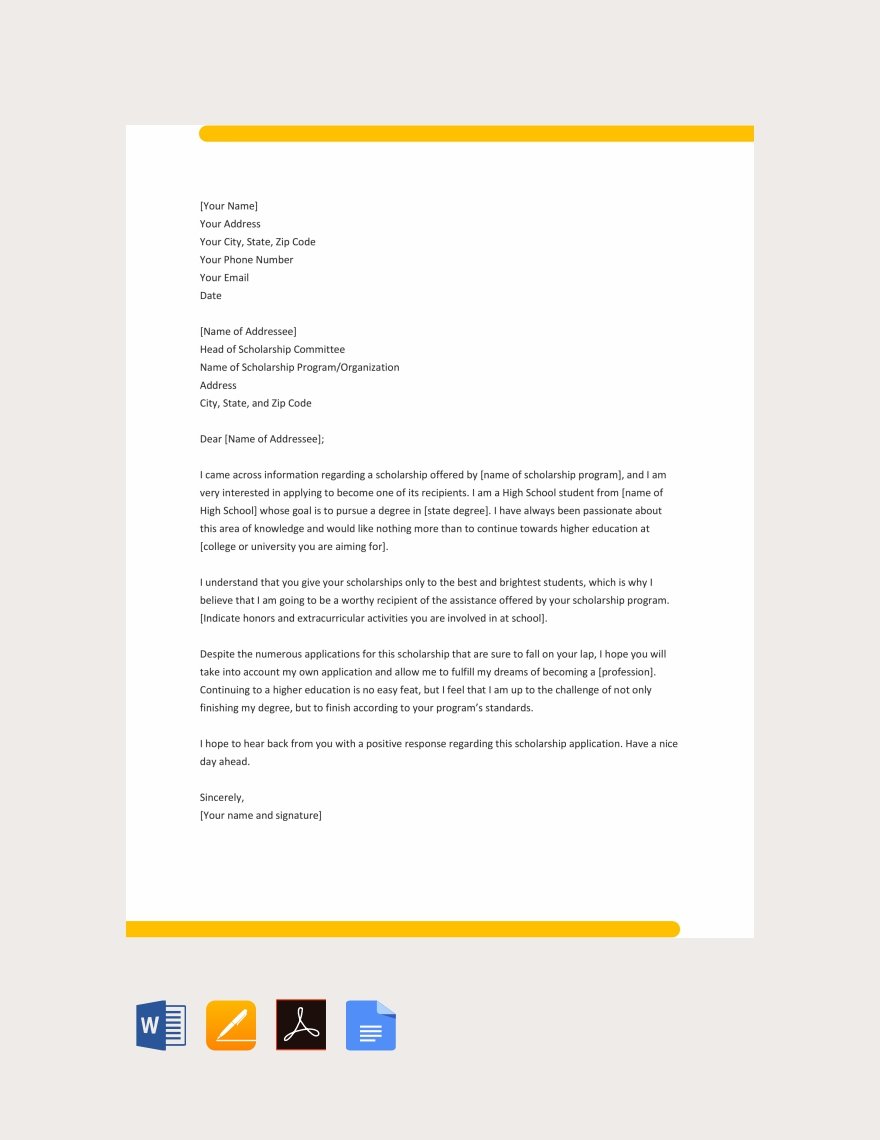
Sample Application Letter For College Admission
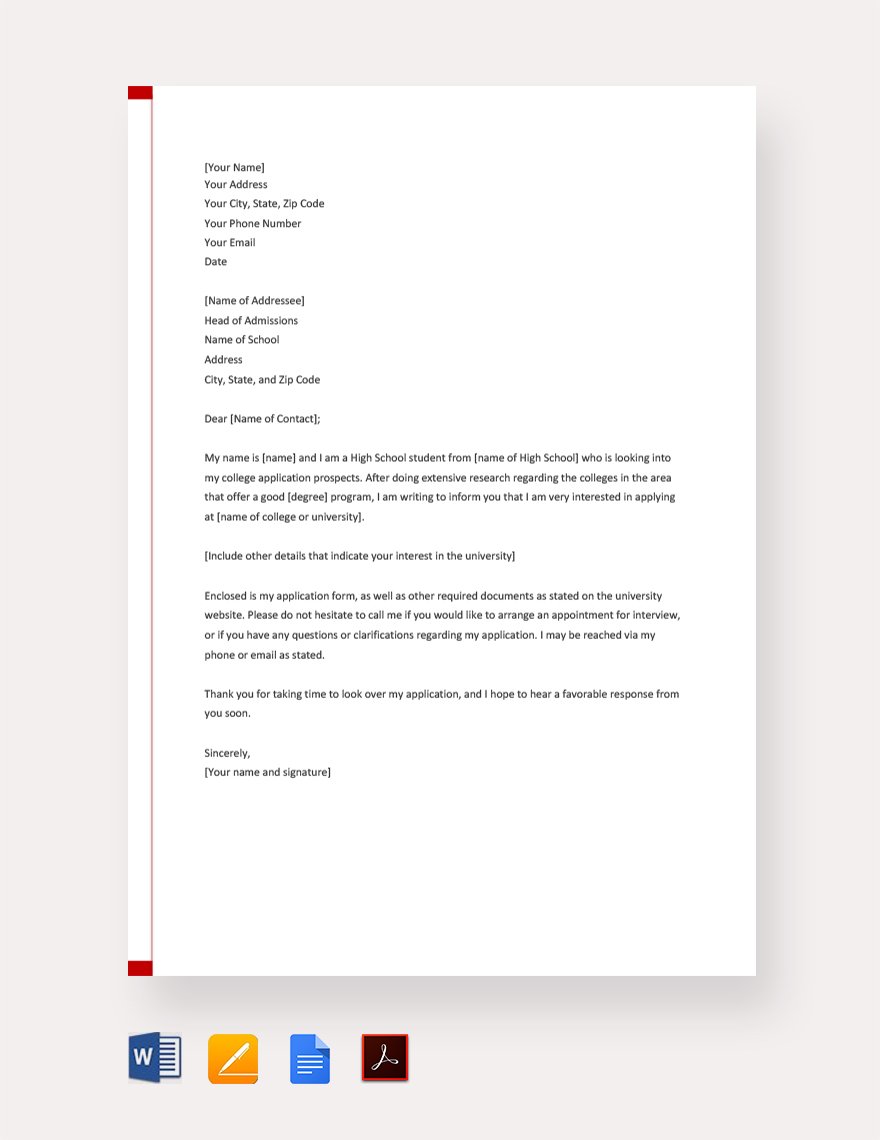
Application Letter For Studying
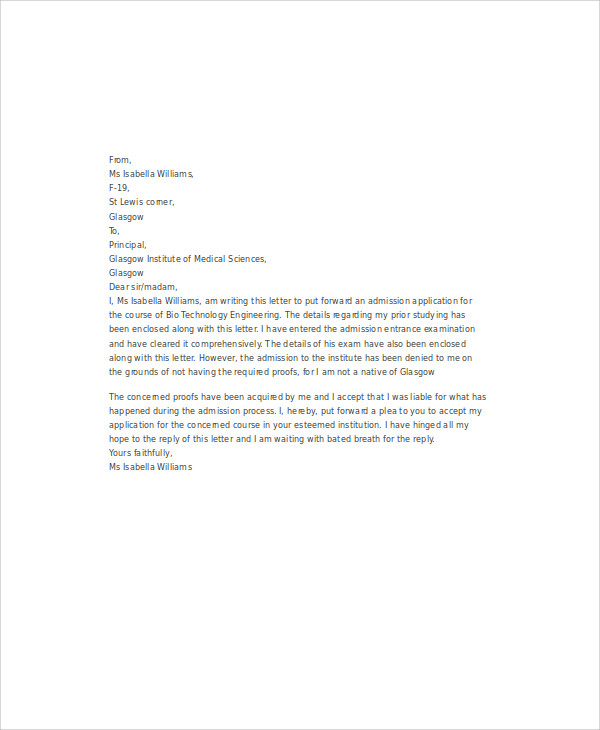
Application For Enrollment In University
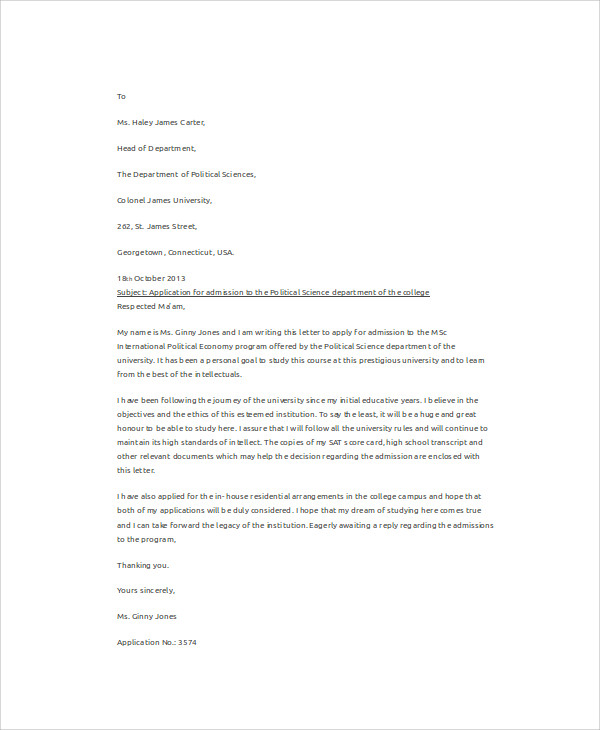
Best College Application Letter
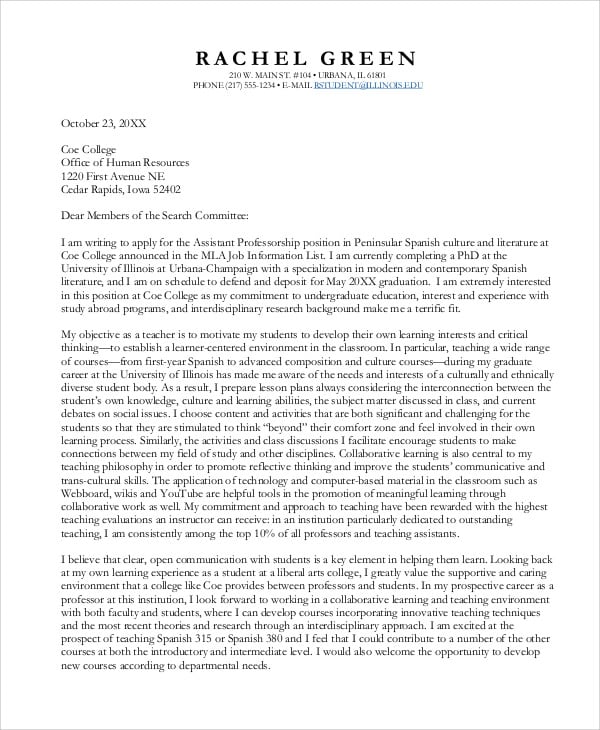
College Application Letter Sample PDF
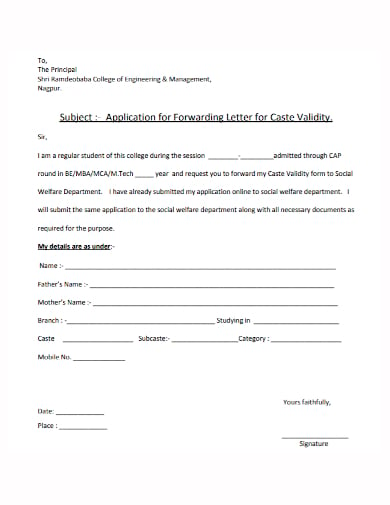
College Application Letters Used in Academic Transactions
- A college application letter is used by a student who would like to enroll in a learning institution. Most of the time, it is one of the requirements for enrollment which is why it is essential to be done.
- A college leave application letter is written by a student who will have a temporary absence in the course that he or she is currently studying due to valid reasons.
- A college admission application letter is used by a student who would like to apply for an academic slot for a specific course offered by a school. You may also see Academic Letters
- College scholarship application letters are written by students who would like to get a scholarship grant—be it from the high school template, a government institution, or any other entity offering education assistance.
- College workshop application letters are created by students who want to be a part of a specific academic workshop that will be conducted within the premises of the institution.
- College application reference letters are written by the references of a student applicant so that there will be a supporting document that may be used either for admissions, enrollment, or other special academic functions.
- College withdrawal application letters are used to formally announce the decision of the student to not push through with his or her college studies in the academic institution where s/he is currently attending.
Parts Of application Letter For College Admission
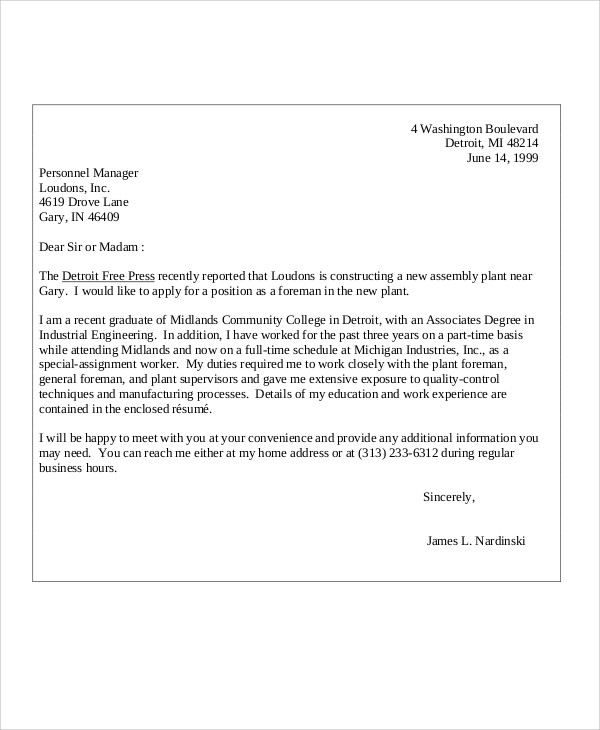
Sample Application Letter For A Course
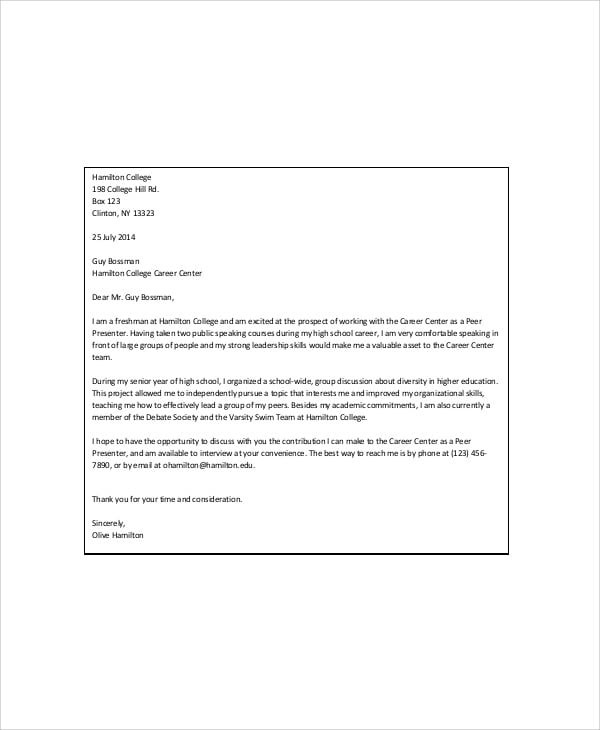
College Application Recommendation Reference Letter Template
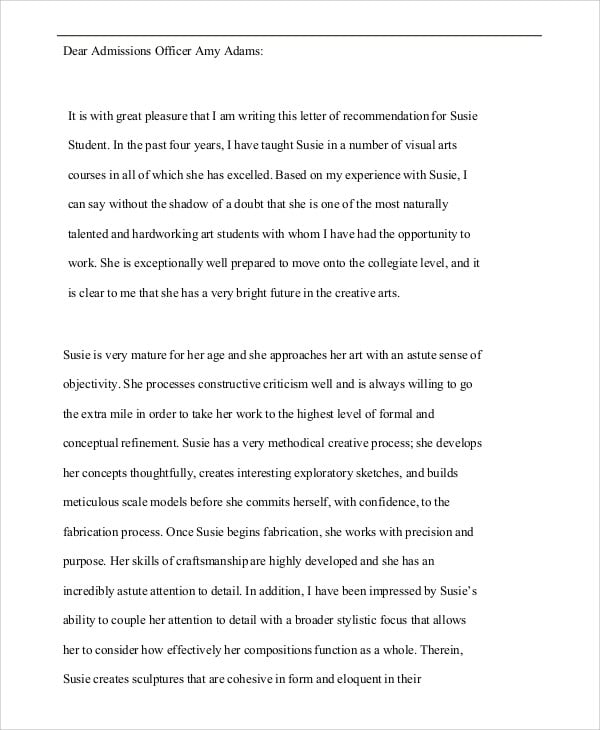
College Withdrawal Request Application Letter Format Template
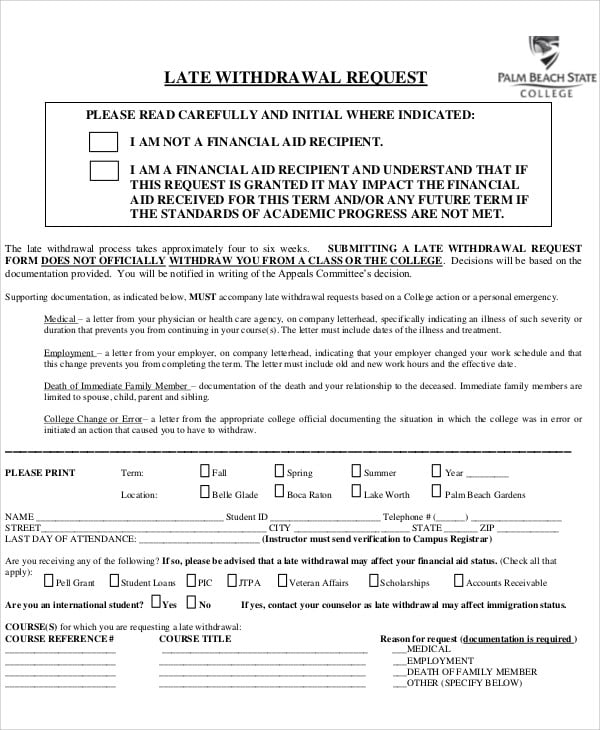
College Instructor Application Letter Writing Template
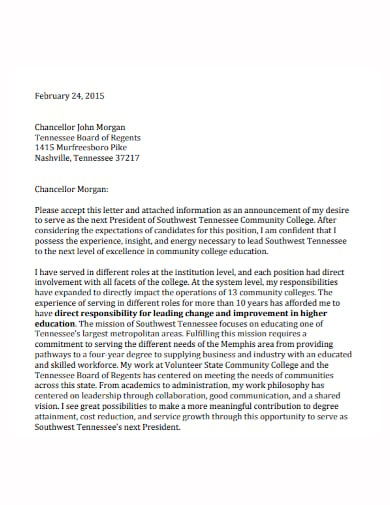
Business College F ull Block Style Application Letter Template
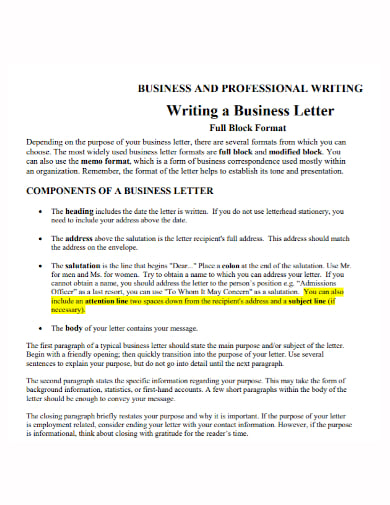
Architecture College Application Letter Template
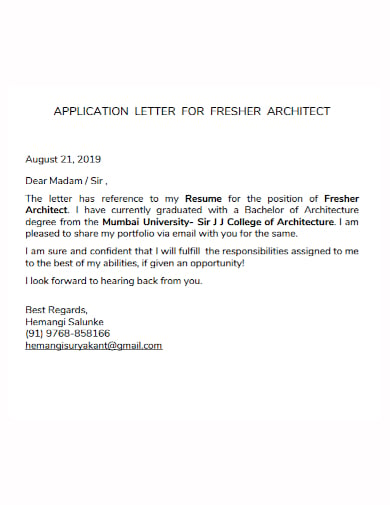
Accounting College Application Letter Template
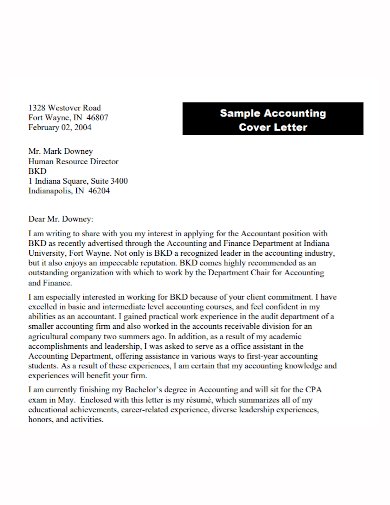
Medical College Application Letter Template
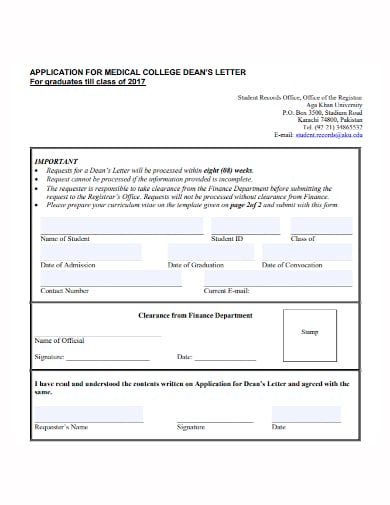
College Application Letters Used for Work Purposes
- The internship experiences of the applicant
- The seminars and training that the applicant has attended
- The academic achievements of the student
- The skills, talents, and other competencies of the graduate may be helpful in the operations of the business.
- The experiences of the applicant in terms of teaching
- The field of study that the applicant can teach
- The kind of teaching commitment that the applicant can provide to the academic institution
- It can be used to apply for a part-time job. You may also see Admission Letters .
- It can be given to the management of the school so they can provide a student assistant job function to the student.
More in Letters
Welcome letter to new college students, job application letter for accountant assistant, admission letter of college, college joining letter, holiday letter for college, visa application letter to embassy, college coach cover letter, college cover letter, college application cover letter, information application letter.
- FREE 26+ Covid-19 Letter Templates in PDF | MS Word | Google Docs
- Thank You Letter for Appreciation – 19+ Free Word, Excel, PDF Format Download!
- 69+ Resignation Letter Templates – Word, PDF, IPages
- 12+ Letter of Introduction Templates – PDF, DOC
- 14+ Nurse Resignation Letter Templates – Word, PDF
- 16+ Sample Adoption Reference Letter Templates
- 10+ Sample Work Reference Letters
- 28+ Invitation Letter Templates
- 19+ Rental Termination Letter Templates – Free Sample, Example Format Download!
- 23+ Retirement Letter Templates – Word, PDF
- 12+ Thank You Letters for Your Service – PDF, DOC
- 12+ Job Appointment Letter Templates – Google DOC, PDF, Apple Pages
- 21+ Professional Resignation Letter Templates – PDF, DOC
- 14+ Training Acknowledgement Letter Templates
- 49+ Job Application Form Templates
File Formats
Word templates, google docs templates, excel templates, powerpoint templates, google sheets templates, google slides templates, pdf templates, publisher templates, psd templates, indesign templates, illustrator templates, pages templates, keynote templates, numbers templates, outlook templates.
College Acceptance Letter: What to Expect When You’re Accepted
College acceptance letters- a collegeadvisor guide.
Every year, when college acceptance letters are sent out, thousands of students hope to receive a college acceptance letter. The letter confirms that they’ve been accepted to their dream school . We know you’ll have a lot of questions about college acceptance letters. Our team at CollegeAdvisor is here to answer those college acceptance letter questions. We want to help you with that final step of university entry.
In this “Guide to College Acceptance Letters” we’ll talk through the following things:
- What to expect when you get into college
- What you’ll find in a typical college acceptance letter
- USC acceptance letter
- Stanford acceptance letter
- Northwestern acceptance letter
- UVA acceptance letter
- How the letter of acceptance will vary from school to school
- Interpreting college rejection letters
- Appealing college rejection letters
We’re committed to helping you get into college – from initial research to your acceptance the college of your dreams. That includes preparing you for what happens even after you submit your college applications.
Let’s start with a few basic FAQs about college acceptance letters:
1. what is a college acceptance letter.
A college acceptance letter is the letter of acceptance a college or university sends out. It tells you you’ve been accepted and officially offers you a place in their upcoming class of students.
2. How do colleges share their acceptance letters?
Most schools notify students electronically and with hard copies, so you can expect both mailed and emailed college acceptance letters. Some students will instead get an email notification to view their college acceptance letters through a school’s online portal.
3. When will I receive a college acceptance letter ?
For Early Action and Early Decision admissions cycles , your college acceptance letter might come early. You will often receive a decision – a college acceptance letter, college rejection letter, or deferral – in December. For the Regular Decision cycle, you will usually receive your college acceptance letter in late-March or early-April.
College Acceptance Letters and you
Now, you have an idea of what a college acceptance letter means. You also know how and when you expect to receive it. Let’s dig deeper into some more detailed information about college acceptance letters. Next, we’ll look at what to expect when reading a college acceptance letter. We’ll also talk about how to respond to college acceptance letters and college rejection letters.
College acceptance letters may seem simple. However, they are packed with information that may influence your college decision. So, an actual example of a college acceptance letter can help you imagine what your letter of acceptance might say. To give you an idea of what your college acceptance letters might sound like, we’ll share sample college acceptance letters. These will include a USC acceptance letter, a Stanford acceptance letter, a Northwestern acceptance letter, and a UVA acceptance letter. Then, we’ll share some important steps you should take after receiving your acceptance letters.
What is a Letter of Acceptance?
As we mentioned, a letter of acceptance is the letter that tells you you’ve got into college. Whether you choose to apply Early Action, Early Decision, or Regular Decision, a letter of acceptance is how schools tell you about your admittance Let’s take a closer look at what these college acceptance letters include.
The primary purpose of a letter of acceptance is to tell applicants they have a place in the incoming class. Therefore, every acceptance letter begins with some form of congratulations. Then, it will give a clearly worded statement that says the school has accepted you into their upcoming class.
Look for info about scholarships & funding
In addition to telling you about your university entry, some college acceptance letters will also include details about funding. These could include financial aid awards, the status of your financial aid application, certain scholarships you may qualify for, and more.
Alternatively, the letter may simply direct you where you can find this information. This might be in your online application, a student portal or their website. While this information can be helpful, not every college acceptance letter will have these details. So, you may need to follow up with your school’s financial aid office to learn more.
Look for next steps
Receiving your college acceptance letter is only the first step of your college enrollment process. Typically, your letter of acceptance will provide next steps. This includes a deadline for when you need to tell the college if you will attend. Many colleges ask for some kind of tuition deposit. Some will also want a signed form that states whether you accept or reject your place. This helps the school update its official record, so they can see how many spots are available for students on the waitlist.
Now, we know a little bit more about what’s in a college acceptance letter. Next, let’s take a look at some real-life sample college acceptance letters. Sample college acceptance letters can let you imagine what to expect as you wait for your own college acceptance letters.
Each college acceptance letter example will be slightly different. For this reason, we’ve included a range of college acceptance letters. That way, you can see the different ways your college acceptance letter might look.
Sample College Acceptance Letters- Exploring 4 Real College Acceptance Letters!
In this college acceptance letter guide, we’ll present a college acceptance letter sample from USC, a college acceptance letter sample from Stanford, a college acceptance letter sample from Northwestern, and a college acceptance letter sample from UVA. Each of these college acceptance letters helps us analyze the different forms a sample of college acceptance letter may come in. Additionally, these examples help us highlight your next steps once you get into college and have your letter of acceptance.
USC Acceptance Letter
Our first college acceptance letter is from the University of Southern California . This sample of a college acceptance letter begins with an excited Congratulations! before clearly stating their offer of admission. This reads, I am pleased to offer you admission to the University of Southern California as part of the entering class of fall 2022.
This USC acceptance letter then continues their congratulations. It highlights the hard work the student put in to get into college – this offer is being extended to you as a result of your outstanding achievements.
This USC acceptance letter then describes the amazing resources you can expect during your time at USC. This includes their faculty of world renowned researchers who look forward to working with remarkable young people who will bring intellect, curiosity, and persistence to the university community.
The letter goes on to describe how USC is one of the most dynamic universities in the world , a place where you will work with scholars of all disciplines, from the sciences to the visual and performing arts, from the humanities to the social sciences and various professional disciplines ; where you will learn from others, we will learn from you, and you will grow to become a leader for the future.
This USC acceptance letter ends with an exciting Welcome to the Trojan Family!
Some college acceptance letters will tell you what to do next in the enrollment process. However, this one doesn’t offer much advice. Rather than outlining next steps, this college acceptance letter sample shows how an acceptance letter can be a warm invitation to join a student body. This type of acceptance letter is less informative than it is aspirational. It invites you to dream about what’s possible should you accept your offer. It’s also designed to persuade you to choose USC instead of another university.
This example of a college acceptance letter boils down to one action item: to look up next steps to enroll. We should also mention that this college acceptance letter is an e-letter that you will view through your application portal. Often, schools send both a digital letter and a hard copy in the mail. However, some schools choose to do one or the other.
Let’s take a look at another letter form more insight into what your future college acceptance letters may hold!
Stanford Acceptance Letter
Our next college acceptance letter is from Stanford . Stanford University if one of the most competitive schools in the US. It had an acceptance rate of just 3.95% for the Class of 2025 . If you’re lucky enough to receive a Stanford acceptance letter, here’s what to expect.
Just like the sample of college acceptance letter above (the USC acceptance letter), this Stanford acceptance letter begins with a Congratulations! You have been admitted to the Stanford Class of 2025! This college acceptance letter example then compliments the applicant, stating they are a fantastic match with Stanford before providing some helpful next steps.
The letter of acceptance briefly states that the student will join a diverse, joyful, and welcoming campus community with a shared determination to make our world better. Then, this Stanford acceptance letter directs students to visit their admitted students website , where they can learn more about the school and what it has to offer. It also points towards Cardinal Quad, their online platform for connecting students, faculty, staff, and alumni.
This sample of college acceptance letter also gives a link to the Stanford Portal, where students can find information about Financial Aid and complete an Admission Response Form before their deadline of May 3 rd .
Conditional statement
Also note that this Stanford acceptance letter contains a brief conditional statement: To keep you r place in the class, we expect you to maintain the quality of your character and return a strong performance in the program of study reported in your application. Additionally, Stanford says that students were admitted, in part, due to this program of study and asks them to report any changes to their academic schedule.
This example of a college acceptance letter boils down to three action items:
- Complete the admission response form by the deadline
- Maintain your grades and a clean record of behavior
- Notify admissions of any changes to your courses
As you can see by comparing the Stanford acceptance letter to the USC acceptance letter, each college acceptance letter you will receive offers different information and guidance for next steps. Let’s take a look at another college acceptance letter example to see what else a college acceptance letter may say.
Northwestern Acceptance Letter
Next, we have a college acceptance letter from Northwestern University . As you will see, this Northwestern acceptance letter, unlike the Stanford acceptance letter and the USC acceptance letter, offers the student admission to a particular school and program of study. This means that when the student applied, they submitted their Northwestern application to a particular undergraduate school. As a result, the letter explains the student has been accepted to the Medill School of Journalism . Medill is one of the top ranked journalism schools in the country, so this is no small feat. Some programs are more competitive than others, so be sure to do your research when applying to your dream school.
Otherwise, the Northwestern acceptance letter begins similarly to the sample of college acceptance letter above. It says: Congratulations and welcome to the Class of 2026 at Northwestern University! The letter then describes how your considerable academic achievements, extracurricular accomplishments, and impressive character stood out as truly exceptional.
Electronic acceptance letters
This sample of college acceptance letter was sent electronically. However, in the letter, admissions notes that you can expect a hard copy via mail, along with materials that outline steps toward enrolling in the Class of 2026.
While the next steps are not officially outlined in this Northwestern acceptance letter, they do provide a link to review these steps on our admitted student website , where you will also find ways to connect with the Northwestern community, engage with the remarkable opportunities available to you here, and experience what makes this place and its people so special.
In addition to a link to the admitted student website, this acceptance letter also gives a link to submit your enrollment decision. The letter clearly states students must submit enrollment decisions by May 1 st .
Similarly to the sample college acceptance letters above, Northwestern asks students to please note, our offer of admission is contingent upon the successful completion of your senior year and a review of your final transcript.
- Be on the lookout for hard copy materials with detailed steps
- Submit your enrollment decision by the deadline
- Maintain your grades and successfully earn your diploma
The three college acceptance letter examples above were all received by CollegeAdvisor students who submitted Regular Decision applications. However, as you might imagine, Early Decision or Early Action college acceptance letters may look a little different. Let’s take a look at our final sample college acceptance letter to learn what else to expect if you submit your application for early admission.
UVA Acceptance Letter
Our final college acceptance letter is from the University of Virginia .
This college acceptance letter sample begins straight away with On behalf of the entire University of Virginia community, we are excited to offer you admission to the class of 2026. This UVA acceptance letter is Early Action. For this reason, the UVA acceptance letter says that while the process was intensely competitive, admissions believes UVA will be better with you here (with the follow up We hope you feel the same way).
This sample of college acceptance letter is similar to those above – it details some of the benefits of university entry at UVA. This makes sense because, although this student applied during Early Action, this admissions decision is non-binding. So this applicant can decide whether to accept this letter of acceptance.
This UVA acceptance letter then goes into detail about how UVA will open doors for you and change your life in ways you can barely imagine . At UVA, students can expect to enter an incredibly close community where you will hear lectures that makes you see the world differently…discover new knowledge, answer enduring questions, and meet people who challenge and inspire you all at once.
Look for the important details
This UVA acceptance letter ends with a final congratulations. In addition, it contains some important next steps and a conditional statement::
Please follow the online instruction in this offer packet to pay your non-refundable tuition deposit by May 1, 2022. Our offer of admission also depends on your ability to maintain the same high standards in both your academic and personal life that earned you this letter in the first place.
This example of a college acceptance letter boils down to two action items:
- Pay your deposit by the deadline to secure your spot
Sample College Acceptance Letters- Final Thoughts
We’ve talked about some sample college acceptance letters and what they include. In particular, we looked at a USC acceptance letter, a Stanford acceptance letter, a Northwestern acceptance letter and a UVA acceptance letter. You may be more excited (or nervous) than ever to receive your own college acceptance letters and get into college!
Now that we’ve reviewed multiple sample college acceptance letters, let’s dig into a few more FAQs. These questions concern how and when you can expect to receive your college acceptance letters.
College Acceptance Letters- More FAQs
Do colleges still mail acceptance letters.
As we saw in the example of a college acceptance letter above, many schools do still mail college acceptance letters. Even though you submit your Early Action, Early Decision, and Regular Decision college applications online, most colleges will still mail you an official college acceptance letter.
Most mailed and electronic acceptance letters will be very similar, so you can expect your hard copy acceptance later to read just like the sample college acceptance letters we included above. However, as with the sample Northwestern acceptance letter above, some schools share different information in each one. So make sure you read both college acceptance letters thoroughly!
Although most colleges will send an acceptance letter in the mail, that isn’t the only way you’ll receive your college acceptance letter. In addition to mailing college acceptance letters, colleges and universities will also notify you virtually. In fact, you’ll usually first learn of your acceptance online, either via email or a school’s online portal.
How do Colleges Notify You of Acceptance?
There are three ways you’ll receive your letter of acceptance: by mail, email, or on your online portal. How schools choose to tell students about their university entry will vary. Check with your school’s office of admissions to see when and how you’ll get your letter of acceptance.
You can expect most schools to mail out hard copies of their college acceptance letters. However, due to possible delays in the mailing system, you’ll also probably get your college acceptance letter electronically.
On the day your school releases admissions decisions, it’s important you can access the email you used in your college applications. Even if schools don’t send your letter of acceptance in an email, you may receive an email that tells you to check an online portal.
Many schools use an online portal to tell students about their university entry. Even if you applied through general application portals like the Common App or Coalition App, some schools will ask that you sign up for a school-specific online portal. Then, they can send you notifications about the status of your application and, hopefully, your letter of acceptance.
How Long Does it Take to Get an Acceptance Letter From a University?
The date you get your college acceptance letter will depend on when you applied to get into college. Students who applied in earlier admissions cycles , either Early Action or Early Decision, can expect their college acceptance letters months before Regular Decision applicants. .
Students who applied Early Decision or Early Action can generally expect to receive their letter of acceptance sometime mid to late December . Early Decision or Early Action cycles tend to be competitive – so only some students will receive a letter of acceptance.
What happens if you are not accepted?
If you don’t get a letter of acceptance, you’ll be told that your application has been rejected or deferred. College rejection letters mean that the school’s decided not to offer you an acceptance letter and a place in their upcoming class.
A deferral letter means that, although you don’t have a place yet, your application was strong and you’ll be considered with the Regular Decision applicants. Deferred students have to wait for the Regular Decision admissions decisions to see if they’ll receive that acceptance letter and get into college.
For advice on what to do if you’re deferred, check out this webinar .
What is a “waitlist”?
Students who applied Regular Decision can expect to receive their letter of acceptance sometime in March or early-April . Similarly to early applicants, you may also receive a letter of rejection at this time. Unlike early Early Action and Early Decision students, Regular Decision applicants can be put on a waitlist .
If you’re on a waitlist, your application has been fully reviewed. Although you’ve met the school’s qualifications, they are unable to offer you university entry for now. However, if another student were to decline their letter of acceptance, you could be taken off the waitlist and offered a place. Because schools don’t tell you where you are on the waitlist, it’s hard to predict the odds of getting accepted from the waitlist .
Are you a parent of a senior who’s receiving college acceptance letters, deferrals, waitlists and college rejection letters? Check out this webinar for some great tips on how best to support your child.
Digital college acceptance letters
Since most application letters are delivered electronically, you don’t need to frantically check your mailbox for your college acceptance letter. Remember, you’ll probably get your college acceptance letters over the course of two to three weeks. Each school will have their own date, and usually even a specific time, they are planning to send out college acceptance letters. Expect to receive your notification on that day before a certain time (be sure to double check the school’s time zone!)
When Should I Expect my College Acceptance Letter?
College acceptance letters and college rejection letters are sent electronically, so you probably won’t have a delay in receiving your letter of acceptance. For this reason, you’re likely to get your letter of acceptance the same day as all other applicants to that school.
March or early April is the time you’ll get most college acceptance letters (unless you applied Early Action or Early Decision!) However, most schools will release college acceptance letters on a specific day within this timeframe.
For example, let’s look at the schools represented by the sample college acceptance letters discussed above. That is, the USC college acceptance letter example, the Stanford college acceptance letter example, the Northwestern college acceptance letter example, and the UVA college acceptance letter example.
These sample college acceptance letters tell us the specific date each school sent out their college acceptance letters. Below we’ve given the dates students can expect to hear about their university entry – with a letter of acceptance, college rejection letters or a waitlist/ deferral notice.
University of Southern California :
- Regular Decision : End of March – March 25 th , 2022
Stanford University :
- Restrictive Early Action : Mid December – December 15 th , 2022
- Regular Decision : Early April – April 1 st , 2022
Northwestern University :
- Early Decision : Mid-December – December 17 th , 2022
- Regular Decision : End of March/Early April – March 25 th , 2022
University of Virginia :
- Early Decision : Mid-December – December 15 th , 2022
- Early Action: January 31 st – February 15 th 2022
- Regular Decision : End of March – April 1 st , 2022
The specific dates may change from year to year, so be sure to check each school’s website for the exact day you’ll hear about university entry.
If you are planning to submit applications to one or more Ivy League school, you should know when Ivy Day is coming up. Ivy Day is the date all Ivy League schools notify Regular Decision applicants of their admissions decisions. It’s normally in late March, similarly to other school’s Regular Decision admissions notification timeline. In 2022, Ivy Day was on March 31 st .
Because the majority of students apply Regular Decision, most students will get their college acceptance letters sometime in mid- to late-March or early-April. However, if you don’t get a letter of acceptance, you can expect college rejection letters or waitlist notifications.

Patience is key
If you are put on a waitlist , you may feel unsure about next steps. There is no exact timeline for when you can expect to get off of a waitlist. Enough students need to decline their letter of admission for you to move off of the waitlist and be offered university entry. While there’s a chance you get off the waitlist within a month of receiving your admissions decisions, it could be late summertime before you hear back.
Once you have a college acceptance letter (or college rejection letters) from all your schools, it is time to make a decision . If you had a good ‘get into college’ game plan, you’ll have applied to the right combination of safety, match, and reach schools . So you’ll probably have more than one letter of acceptance.
Because not every school sends out their college acceptance letters on the same day, you’ll have time to think about which college acceptance letters you want to accept. For most schools, the deadline for responding to your college acceptance letter is May 1 st .
How to Respond to a College Acceptance Letter?
Since you’ve seen our sample college acceptance letters, you already have an idea of what to expect in a letter of acceptance.
What are your next steps when all your college acceptance letters have come in? You must respond before your school’s enrollment deadline to confirm your acceptance. As you saw in the sample college acceptance letters, schools will tell you when their deadline for acceptance letter response is.
University enrollment takes place entirely online, so you don’t have to worry about mailing in forms or sending documents on time.
Your enrollment process may be different if you applied for Early Action or Early Decision university entry. Unlike students who apply Regular Decision, students who get into college during Early Decision will not have multiple schools and college acceptance letters to choose from. Early Decision is, by nature, a binding agreement between you and the school. So, if they give you a letter of acceptance, you must accept your spot .
Regular Decision applications
If you applied Regular Decision, you must accept your offer from the school of your choice and decline the others. Most schools will ask you to notify them either way. This way, they can potentially move other applicants off of the waitlist. Once you’ve decided on the school you’d like to attend, you may be asked to submit a tuition deposit. This is a non-refundable deposit which holds your place in the upcoming class.
If you are waitlisted, all you can do is wait. Additionally, if you are waitlisted at your dream school but have other admission offers, accept one of your other offers before all of the deadlines pass. If you end up getting off the waitlist, you may have to forfeit your original tuition deposit, but at least that way you’ll have a spot at a university either way.
What do College Rejection Letters Say?
Firstly, remember that most students, no matter how stellar they are, will likely receive college rejection letters at some point. We understand that receiving college rejection letters can be hard, especially after months of hard work and preparation.
While college rejection letters are never easy, remember that college rejection letters don’t reflect your worth. The college admissions process is rigorous, unpredictable, and relies on many factors beyond your control. Sometimes it’s not clear why one student will get into college and another won’t.
When schools send out their college rejection letters, it is not always because they don’t think you are a good fit. Sometimes, admissions is simply looking for a certain type of student to round out their incoming class and you didn’t fit the bill.
For tips on overcoming college rejection letters, check out this article .
College rejection letter tone and content
Expect your college rejection letters to be brief and to the point. Admissions will thank you for applying and then say you haven’t been offered university entry. College rejection letters can leave many students wondering “why didn’t I get into college?” You may wonder if there’s anything you could have done to change the outcome. However, most college rejection letters won’t give a reason for the decision about university entry.
Although college acceptance letters may come through the mail at some point, you won’t always receive college rejection letters in the mail. You’ll get your rejection letter in the same electronic manner as you would an acceptance letter – either via email or via your online portal.
Since both acceptance and rejection letters often come out at the same time, you may prefer to wait until the end of the day to check emails or online portals. Then, you have time to process the decision by yourself, whatever the outcome.
Can You Appeal a College Rejection Letter?
While you may feel powerless in the face of college rejection letters , you can always make an appeal .
Appealing college rejection letters means you send a formal request to ask a college to reconsider. However, remember that there’s no shortcut to get into college. Once a school has decided on university entry, they probably won’t reverse this. Once they’ve rejected your application, they’re unlikely to grant you university entry.
While appealing college rejection letters works for some students, admissions decisions are rarely overturned. In their Guide to the College Admissions Appeal Process , U.S. News says the percentage of college rejection letters successfully appealed is low. In the last few years, the percentage of successful college rejection letters appeals was 3-5%.
For most students, unless new information has come to light since you submitted your application (and your grades and test scores are in the top quartile of admitted applicants), your chances of success are low. As a matter of fact, they’re so low that it may not be worth appealing college rejection letters.
Choose a valid reason to appeal
Appeals based solely on your desire to attend a specific school are likely to fail. Many students feel strongly about attending certain universities. Admissions teams have far more students who want to attend than they have college acceptance letters. However, if you experience a significant change in your grades or need to correct an error on your original application, it may be worth looking into the school’s policy for appealing college rejection letters.
If you do decide to appeal your college rejection letters, check the official policy – either from the school’s admission’s website or by contacting the office of admissions. Some schools don’t let students appeal college rejection letters. Meanwhile, others have very strict requirements for appeals to college rejection letters. After schools send their letters of rejection, there’s also usually a strict timeline for appeals. For example, the University of California Berkeley allows freshman applicants four weeks to appeal their college rejection letters.
College Acceptance Letter: Final Thoughts
It isn’t easy applying to get into college. All hard work and hours spent writing supplemental essays and putting together your application culminates in that final moment where you can finally press send. And then you have to wait. Wait to receive your golden ticket, your college acceptance letter confirming your university entry.
Alternatively, you’ll receive your college rejection letters saying that although you were a wonderful applicant, this just isn’t the school for you.
The waiting can be hard, but that is why it is so important to plan ahead and send out the best applications you possibly can. Choose schools where you think you’ll shine. This will make that moment when your acceptance letter finally comes in worth it.
In this “Guide to College Acceptance Letters”, we’ve talked about:
- College acceptance letters
- How you’ll receive college acceptance letters
- Some sample college acceptance letters
- Your next steps after college acceptance letters and college rejection letters
If you have received multiple college acceptance letters, you’ve finally reached the fun part: deciding! Choosing the school you are going to attend for the next four years is a big decision and one you eventually have to make for yourself. Talk to current students or faculty, visit if you can, consider the pros and cons of each school, and go with the place you’ll thrive.
Check out our resources
If you’re just starting the college application process, don’t think too much about college acceptance or rejection letters. Check out our resources on Applying to Ivy League Schools , Determining a College Essay Topic , and even Summer Planning for 8 th , 9 th , and 10 th Graders .
If you’re not sure where to start, our expert team of Advisors can work with you through every step of the process:
- building your college list
- writing your essays
- honing your candidate profile
Work with us to maximize your chances of receiving an acceptance letter.
CollegeAdvisor offers a range of college application services to help students get into college. If you want college application guidance from expert college application Advisors, get started today with your free account or schedule an advising consultation by calling (844) 343-6272.
This guide to college acceptance letters was written by Stefanie Tedards. At CollegeAdvisor, we have built our reputation by providing comprehensive information that offers real assistance to students. If you want to get help with your college applications from CollegeAdvisor.com Admissions Experts , visit us online or call (844) 576-0953 to schedule your free advising consultation . We’re excited to help start you on the path to a successful future!
Personalized and effective college advising for high school students.
- Advisor Application
- Popular Colleges
- Privacy Policy and Cookie Notice
- Student Login
- California Privacy Notice
- Terms and Conditions
- Your Privacy Choices
By using the College Advisor site and/or working with College Advisor, you agree to our updated Terms and Conditions and Privacy Policy , including an arbitration clause that covers any disputes relating to our policies and your use of our products and services.
Privacy preference center
We care about your privacy
When you visit our website, we will use cookies to make sure you enjoy your stay. We respect your privacy and we’ll never share your resumes and cover letters with recruiters or job sites. On the other hand, we’re using several third party tools to help us run our website with all its functionality.
But what exactly are cookies? Cookies are small bits of information which get stored on your computer. This information usually isn’t enough to directly identify you, but it allows us to deliver a page tailored to your particular needs and preferences.
Because we really care about your right to privacy, we give you a lot of control over which cookies we use in your sessions. Click on the different category headings on the left to find out more, and change our default settings.
However, remember that blocking some types of cookies may impact your experience of our website. Finally, note that we’ll need to use a cookie to remember your cookie preferences.
Without these cookies our website wouldn’t function and they cannot be switched off. We need them to provide services that you’ve asked for.
Want an example? We use these cookies when you sign in to Kickresume. We also use them to remember things you’ve already done, like text you’ve entered into a registration form so it’ll be there when you go back to the page in the same session.
Thanks to these cookies, we can count visits and traffic sources to our pages. This allows us to measure and improve the performance of our website and provide you with content you’ll find interesting.
Performance cookies let us see which pages are the most and least popular, and how you and other visitors move around the site.
All information these cookies collect is aggregated (it’s a statistic) and therefore completely anonymous. If you don’t let us use these cookies, you’ll leave us in the dark a bit, as we won’t be able to give you the content you may like.
We use these cookies to uniquely identify your browser and internet device. Thanks to them, we and our partners can build a profile of your interests, and target you with discounts to our service and specialized content.
On the other hand, these cookies allow some companies target you with advertising on other sites. This is to provide you with advertising that you might find interesting, rather than with a series of irrelevant ads you don’t care about.
University Student Cover Letter Samples & Examples That Worked in 2024

Embarking on the career path, the first step to success is creating a compelling university student cover letter . This powerful tool can unlock doors to internships, jobs, and exciting opportunities within your field of study.
And so, in this guide, we'll equip you with useful tips, real-life examples, and compelling templates, that'll help you get closer to your dream job. Read on and learn about:
- Creating a visually appealing header for your university cover letter
- Researching employers to craft a personalized cover letter
- Writing a compelling introduction as a university student
- Showcasing your best skills and accomplishments as a university student
- Completing your university student cover letter with a strong conclusion
- Finding the best job search resources for university students

1. How to create a visually appealing header for your university cover letter
To begin writing your university student cover letter, your first key step is to create a header.
A cover letter header serves two main purposes: to introduce you to the employer and to give your cover letter an appealing visual structure .
Within your header, you should include:
- Your name and professional title (if you do not have a professional title yet, you can use the title of the job you are applying for and add “Student” at the end)
- Your professional contact information
- The name of the company or organization you are applying to
Here is an example of a well-formatted university student cover letter header
Mason Wilds , Hospitality Management Student (123) 456-7890 | [email protected] | linkedin.com/in/mason-wilds
To: Hilton Head Hotels 1234 Street Address New York, NY
2. How to personalize your university student cover letter
One crucial step to take before beginning to write the body text of your cover letter is to research the employer beforehand. This gives you the opportunity to learn more about them and uncover key details about the company that you can reference throughout your cover letter .
Important information to look for during your research includes:
- Major projects, partnerships, or programs the company is involved in
- The company’s goals, values, and requirements for staff
- The person at the company responsible for hiring and reviewing applications
Using the third piece of information, you can create a personalized greeting that addresses this specific person by name. This lets them know immediately the effort you have put into researching and tailoring your cover letter for them specifically.
Here are 3 examples of personalized cover letter greetings
- Dear Mr. John Applewood,
Dear Hiring Manager John Applewood,
- Dear Mr. John Applewood & the Hiring Department,
3. How to write a compelling introduction as a university student
Next up, you need to begin the body text of your cover letter with a compelling introduction .
To write a strong introduction as a university student, make sure to include:
- A brief overview of your academic experience (most students will have minimal professional experience, making academic experience highly important to describe in a cover letter)
- Your specialized area of expertise (such as the degree you are working toward)
- A concise statement on why you are a great fit for the position
Here is an example of a great introduction from a university student’s cover letter
I am a junior at the University of South Carolina, with two semesters left to complete my degree in Business and Hospitality Management. As I approach my final year of school, I am seeking an internship opportunity with a major hotel chain to hone my hospitality skills and build industry connections. Having earned a spot on my university’s Dean’s List for three consecutive years, I will bring an exceptional work ethic and commitment to excellent service to this position.
Find out your resume score!

4. How to showcase your best skills and accomplishments as a university student
Once your introduction is written and you are satisfied with it, you can move on to writing the remaining body paragraphs of your university student cover letter.
In these body paragraphs, your main goal is to showcase your top skills or accomplishments that are relevant to the job you are applying for. As well as describing these qualifications , you can also use the research you did earlier to reference specific needs of the company and how your skills meet those needs.
Here are 6 examples of skills to describe in a university student cover letter
- Communication (always describe your style of communication)
- Collaboration and teamwork
- Critical thinking
- Time management
- Responsibility
Here is an example of how to describe an accomplishment in a cover letter
As a student at the University of South Carolina, I have served as an Orientation Leader for two years, helping to bring new undergraduate students into the fold and get comfortable in their new surroundings. I recently earned the position of Head Orientation Leader thanks to my overwhelming positive reviews from new students I have mentored. Of the 300+ students I have worked with, 95% gave me a five out of five-star rating at the end of their Orientations.
5. How to complete your university student cover letter with a strong conclusion
The last step to writing your university student cover letter is to craft a strong conclusion . In this conclusion, you should include:
- The best times and days of the week to contact you
- When you are anticipating a response from the employer
- When you plan to follow up with the employer
- A formal sign-off
Here is an example of a strong conclusion from a university student's cover letter
I am honored to be considered for this position and hope to hear from you within the next week regarding this opportunity. You may best reach me at (123) 456-7890 on Mondays through Fridays from 10 a.m. to 7 p.m. As I am excited to learn more about this opportunity, I do plan to follow up next Monday morning if I have not heard back about this position.
Many Thanks,
[Applicant Name]
6. Useful resources for job-seeking university students
As a university student standing at the threshold of a professional career, having the right set of resources can truly empower your job hunt. Let's explore the must-haves in your arsenal:
- University career services: Your own university is a potent resource. Career Services offices often provide resume and cover letter reviews, interview preparation, and job placement assistance. Don't overlook these gems.
- Job search platforms: From LinkedIn to Indeed , these platforms teem with job opportunities perfect for recent graduates. They also offer search filters to streamline the hunt and make it less daunting.
- Field-specific job boards: Niche job boards like Idealist (for non-profits) or Dice (for tech) cater to specific fields, making your job search more focused and productive.
- Online portfolios: Platforms like Behance or GitHub , depending on your field of study, allow you to create an online portfolio showcasing your work. This can be a powerful supplement to your university student cover letter and resume.
- Networking events: Attend career fairs, industry conferences, or university alumni events to build your professional network. You never know which connection might lead to a promising opportunity.
- Internship websites: Websites like Chegg Internships or WayUp specifically cater to students seeking internships, often the stepping stone to a full-time job.
Armed with these resources, you're ready to embark on the exciting and rewarding journey of your job search. Happy hunting!
University Student Cover Letter FAQ
Draw attention to your academic achievements, any relevant coursework, and transferrable skills you’ve developed throughout your academic career. If you have undertaken internships or projects, summarize what you’ve learned from these experiences and how they can bring value to the prospective role.
Aim to keep it concise and engaging. Typically, a cover letter should not exceed one page. Remember, it's about the quality of your words, not the quantity.
While it's fine to have a standard outline, your cover letter should always be tailored to each job application. Personalizing your cover letter for each role can show the hiring manager your genuine interest in their specific opportunity.
It's generally a good idea to include a cover letter when applying for a job. It gives you another platform to sell your skills and show your enthusiasm for the role and company.
Yes, definitely. Extracurricular activities can highlight your team skills, leadership qualities, and dedication. Remember to connect them back to the skills or qualities the job posting is seeking.

Julia Gergelova
Julia is a professional writer, translator and graphic designer. She holds degrees in translation and interpretation, and has international work experience from a number of different countries in Europe as well as China and Panama. Julia formerly taught academic writing and as a graphic designer contributed to outlets such as The Business of Business . She has a passion for lifelong learning and good coffee.
All student cover letter examples
- Formal Sciences Student
- High School Student
- Humanities Student
- Student Internship
- Natural Sciences Student
- Professions And Applied Sciences Student
- Social Sciences Student
All university student cover letter examples

Related university student resume examples

Let your resume do the work.
Join 5,000,000 job seekers worldwide and get hired faster with your best resume yet.

University letters of recommendation: an essential guide
Letters of recommendation can make or break a student’s university application, so it’s important that we get them right

Phillip Wenturine

You may also like

There are a plethora of documents that go into compiling the perfect college application. From transcripts to predicted grades, activity lists, resumés or CVs, essays, recommendation letters, certificates and more – each element of the application holds a different purpose and separate weight of importance, often varying from country to country and university to university.
By the senior year (Year 13), academics are nearly finalised, so there’s little wiggle room when it comes to improving that element of the application: senior GPA is set and calculated; IB predictions are nearly issued.
But beyond academics, some universities require recommendation letters, and this is where a student can stand out more, highlighting and emphasising their skills, qualities and abilities.
These recommendation letters can sometimes illuminate the true heart and soul of the student, beyond their transcripts or personal-statement essay. The words in these letters can make or break a student’s application, so it’s important we get them right and tell their story with the thought and effort it deserves.
Teacher letters of recommendation
In a teacher’s recommendation letter, students are brought to life beyond their grades, showcasing their holistic potential.
Teachers seize the chance to praise consistent academic excellence, to spotlight specific projects or skills, and to contextualise grade fluctuations resulting from personal circumstances.
These letters illustrate growth, revealing students’ readiness for university life. The emphasis is on articulating acquired skills and potential – a narrative far more impactful than grades alone. While an A-grade student may excel in tests, a B-grade student might exhibit invaluable traits, such as grit and resilience, best articulated through personalised advocacy.
Recommendation letter timelines
To support students and teachers, it’s important to highlight the importance of the teacher recommendation letter early on to teachers and students alike. Let students know as early as grades 10 and 11 (Years 11 and 12) that it’s important to build relationships with teachers well in advance of senior year. The best letters come from those teachers who have an excellent rapport with the student in question.
Ask students in the spring of junior year (Year 12) to select those teachers they would like recommendation letters from. The recommendation should ideally come from a core-subject teacher (maths, science, social studies, English) rather than an elective teacher, unless the elective is a field in which they intend to pursue a career.
To support the teachers, we work with students to compile what we call a brag sheet. Students answer a series of questions about themselves, in order to give the teacher the best context for writing the letter.
We tell teachers that if the student does not provide this brag sheet, or if they feel that the student has not performed well enough in their class to deserve a letter, they are allowed to respectfully decline the request to write the letter.
We also remind teachers that they do not need to agree to write any more than 20 letters. It is unfair if students all ask one teacher – who may then end up writing 60 letters – for a recommendation letter, while other teachers only have to write a few.. With that in mind, we also remind students of the importance of being organised and requesting the letter from their preferred teacher early on.
Writing the letters
Here are some examples of the questions we ask students on their brag sheets, which then give teachers a starting point for their letters:
- What do you hope this letter will show about you that your GPA doesn’t?
- What was a challenge that you faced in this class, and what actions did you take to overcome it?
- Describe how this class influenced you, either through academic content or teacher interaction.
- Give between one and three examples of times when you have exceeded expectations with your communication skills, and also some areas where you can reflect that you may need growth.
- What majors or careers interest you?
To support the teachers further, we host a writing workshop in the spring of each year to give them examples of strong and weak letters (all confidential). We coach them in "show, don't tell" when it comes to writing about students’ strengths, as well as giving them concrete examples of how best to advocate for students and highlight their strengths.
We review what each different country’s universities desire from these letters, as some universities – such as the US – appreciate a holistic view of the student (for example, highlighting student athletes or detailing extracurriculars). By contrast, the UK is very academic-focused and prefers to read about the student’s abilities when working on class projects, research and outside endeavours in the field of study.
Counsellor recommendation letters
Some universities – mostly in the US – also allow a counsellor letter of recommendation. This letter goes beyond academic ability in the classroom and speaks more to students’ characteristics, personality, outside involvement and external factors helpful for an admission committee to review in the context of other application documents.
The counsellor’s role is to fill in the missing pieces of an application: we help identify and tell a student’s story, covering any hardships, exceptional leadership abilities, impressive commitment to community and so on.
Now more than ever, admission committees are telling us that they trust the counsellor and teacher letters to help give them the full picture of a student, and to help them judge whether or not they will be the best fit for their incoming class and able to thrive on their campus.
We send our students what we call a junior questionnaire, in order to collect the information necessary to write these letters successfully.
Some examples of the questions on the junior questionnaire:
- What languages do you speak, and to what level of fluency?
- Please provide some details about your family and highlight any diversity and/or adversity that you have experienced.
- Have there been any major circumstances that have impacted on your personal or academic life?
- What are three adjectives you would use to describe yourself? Think deeply about this one.
- How have you used your time outside of school, and can you elaborate on any particular projects, clubs, work experience, internships, or volunteer work that speaks to consistency in an activity, leadership experience or a particular commitment to have an impact on your community?
External letters
Sometimes students may wish to have an outside recommendation letter from a coach – for example, if they are a student athlete.
Overall, references should be academic-focused, but some universities that accept more than one letter are willing to receive one from an outside observer, too. In these cases, the person should be someone who oversees the student as the coach of a sport or the supervisor of an internship or work-experience programme.
The external referee should give this letter to the counsellor to send off on their behalf, as all recommendation letters must confidential and never shared with the student.

Admission Essay
Admission essay generator.

It is always a student’s lucky day when they have been given admission to their favorite school, favorite college or university. Even those who may apply for a scholarship and have been granted admission would be without a doubt amazing. To many, this may sound like an easy task and not something to be proud of, but for those who have gone through a lot of effort in attaining the place they want, it is nothing short of a feat. To be admitted to your dream college or university, or even to be admitted to a scholarship grant, any student can tell you that it is never easy. That you need to adhere to the requirements, and one of which is an admission essay . For you to be able to get a complete picture of what an admission essay is, check out 10+ admission essay examples below.
10+ Admission Essay Examples
1. college admission essay.
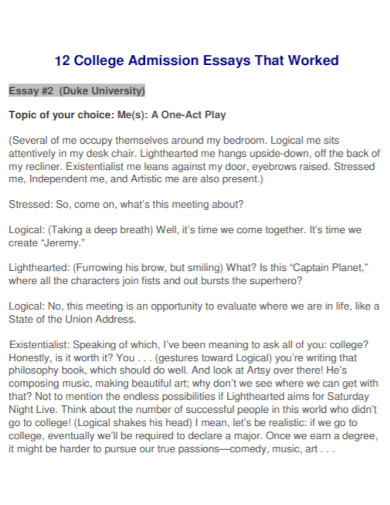
Size: 105 KB
2. Graduate Admission Essay
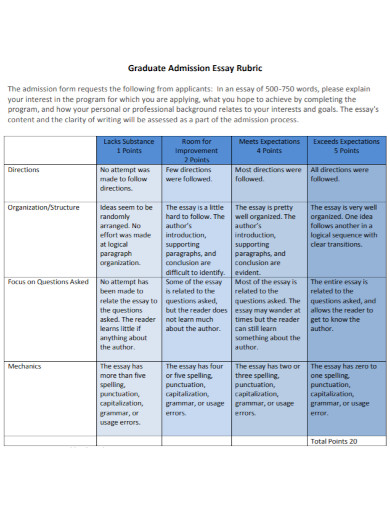
Size: 188 KB
3. Admission Application Essay
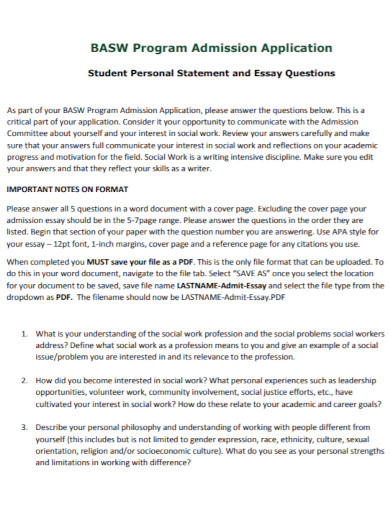
Size: 261 KB
4. Scholarship Admission Essay
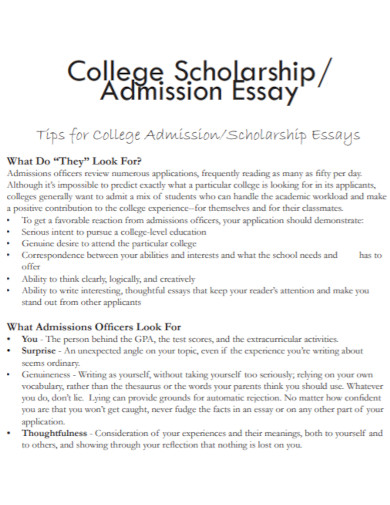
Size: 183 KB
5. Student Admission Essay
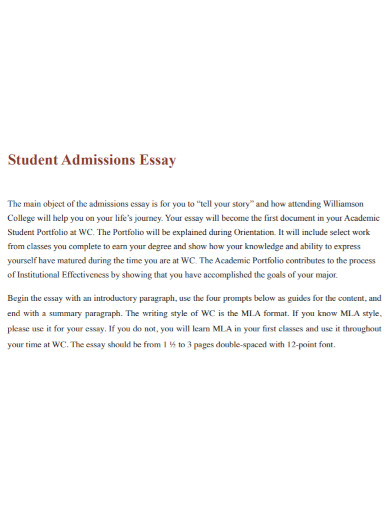
Size: 149 KB
6. University Admission Essay
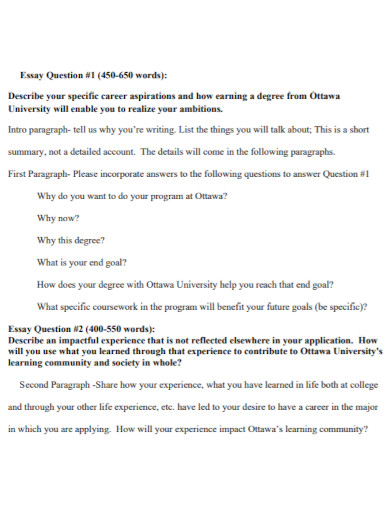
7. Draft Admission Essay
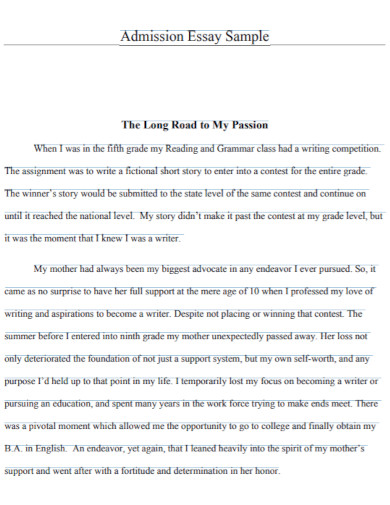
Size: 52 KB
8. Standard Admission Essay
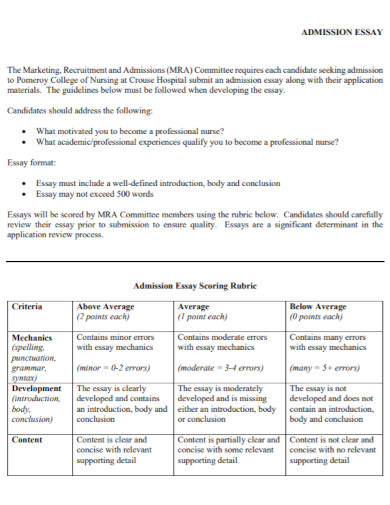
Size: 33 KB
9. Education Admission Essay
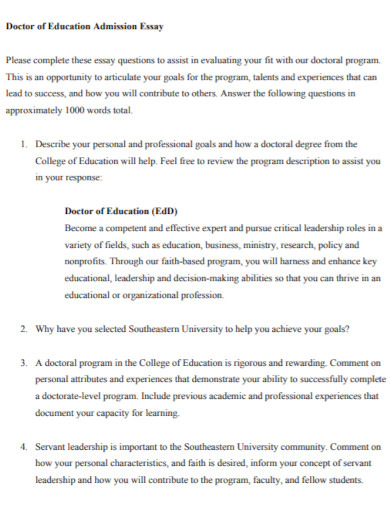
Size: 53 KB
10. Application for Admission Essay
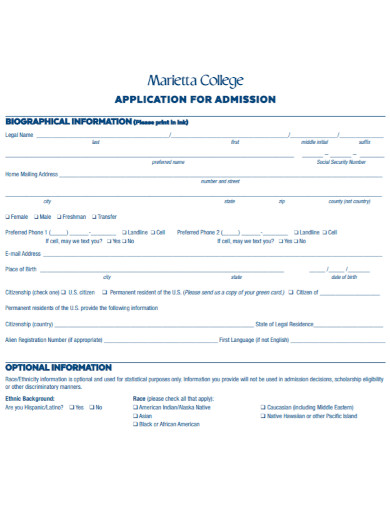
Size: 559 KB
11. MBA Admission Essay
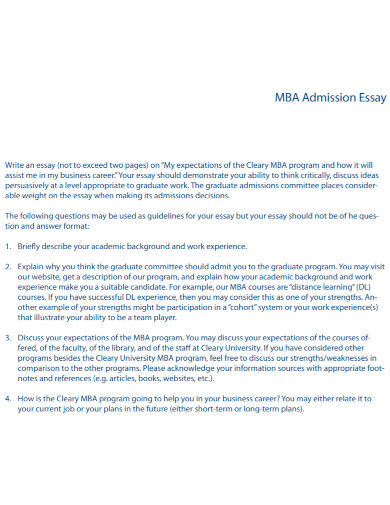
Size: 27 KB
Definition of Admission Essay
An admission essay also called an application essay is an essay written by a potential student applying for college or for a scholarship. It is also an essay that gives out a personal statement about the student and the reason why they should be accepted. These types of essays usually give out some information about the potential applicant, their strengths and weaknesses, their dreams and aspirations. These essays are often asked to be written so that the people assigned for admission to students can evaluate if these students are the ones they are looking for. Admission essays often depend on how long or short potential students may write it.
Importance of Admission Essay
The importance of an admission essay is it gives out information about you as a person to the admission committees. It also shows them your writing abilities and understands you on a personal and academic level. Admission essays play an important role when you are applying for college or a scholarship. As this is what they often base who they admit to their schools or to the said scholarship. It is not easy to write an admission essay especially when you are limited to how you want people to see you and how you want people to know about you both personally and academically.
Tools Used for Admission Essay
- Fill out Form
- Questionnaire
Tips for Writing an Admission Essay
As you begin writing your admission essay, there are some things you may want to consider. These tips below will help you out before writing the essay. Think of these tips as a guide throughout your essay. A roadmap to writing your admissions essay. With these tips and with your ideas, it would be a breeze.
- Read the instructions – This may sound cliché but some students do not bother reading the instructions. They are there for a reason. To know what you are going to write, read what they are asking you to do. Not only is this an important thing to remember, the people in charge would also know that you are not the type of person who may act on impulse. Read what is asked first.
- Organize your thoughts – Before you begin writing your essay , start by making a list of your ideas in a separate piece of paper. Better yet, start by making a draft of the ideas you may want to write about. The best way of having to write an essay is by making a draft of the ideas you have and being able to organize your thoughts. This is also a better way for you to be able to write smoothly from then on.
- Stick to your topic – Learn more about your topic, by doing this, you are able to concentrate on what you want to write about. Choose a topic that you are familiar with and have something to talk about. Avoid choosing topics that may be too difficult for you or would cause a lot of misunderstandings. Also, avoid moving back and forth between two topics. Stick to the topic you choose to write about.
- Avoid misspelled words, fragments and runny sentences – Check your spelling , fragments and runny sentences. Avoid these as much as possible as this can also affect your score. When you write your final output, these must not be a part as much as possible. In addition to that, always recheck just in case.
- Review your work – Writing the final output should be enough for some. But it is also best if you check your work for anything that you may have missed. It is best to review all you have written, to see if you have followed the instructions and given what is being asked. Once you have done so, you may now hand it over and wait for the results.
Is there a word limit to writing an admission essay?
You are expected to write around two hundred to six hundred and fifty words in your admission essay. This includes who you are as a person, your skills, talent and the reason why you want to be admitted to the university of your choice or to the scholarship of your choice.
What should be avoided when writing an admission essay?
Avoid writing things that are not being asked of you. Also, do not use flowery language or difficult jargon. Rather, use words that are easy to understand or words and phrases that are appropriate for your age range. In addition to that, avoid writing things that may not be true to you just to make your admission sound better.
How can I make my admission essay better?
Make a draft before you write your final output. That way you are able to adjust your thoughts and write what is true to you. In addition to that, it also helps you rearrange your ideas and be able to write a better admission essay that is true to you.
Who is the audience for my admission essay?
The school you are applying for or the scholarship you are applying for would be the audience to your essay. Be careful how you write or word your essay.
Writing an admission essay to get to a school or college or a scholarship is never easy. You must be very careful how you write and should only write what is true to you. There may be times you might get tempted to write something to make it sound better, but this is not the case. It is better to be honest with how you write about yourself than to make it sound fancier and more unreal.
Text prompt
- Instructive
- Professional
Write an admission essay about a challenge you've overcome and what you learned from it.
Describe in an admission essay a project or activity that sparked a passion for your chosen field.
LET US HELP
Welcome to Capella
Select your program and we'll help guide you through important information as you prepare for the application process.
FIND YOUR PROGRAM
Connect with us
A team of dedicated enrollment counselors is standing by, ready to answer your questions and help you get started.

How to Apply to Capella University
Admission requirements.
Choosing a degree program or certificate is the hard part. Applying should be easy.
- Admission Requirements
Before you apply: admission requirements
All Capella applicants must meet the following admissions criteria. Some degree programs and certificates have additional requirements. GRE, GMAT, SAT or ACT are not required for admission. Take a look at the requirements and find everything you need to start your application.
$0 Application fee
Apply today with no application fee and no hidden fees for transcripts or transfer credit evaluation.
Identification
Applicants must provide a valid, government-issued form of photo identification.
Transcripts
Provide copies of official transcripts from previous institutions for relevant coursework.
Minimum GPA
Each program has specific minimum GPA requirements for admission.
Acknowledgment agreement
Agree to abide by Capella policies and program requirements.
English proficiency
All applicants must understand, read, speak and write fluently in English.
Are you an international student?
- Individual programs
- Learning format requirements
Some Capella degree programs have additional admission requirements. See the program page or ask an enrollment counselor for details. These requirements may include:
- Forms and documents disclosing licensure information, background and work experience
- Letters of recommendation
- Curriculum vitae or resume
- Essay or writing sample
- Faculty interview
- Registration acknowledgement form
- Masterâs degree from an institution accredited by a U.S. Department of Education-recognized accrediting agency or an internationally recognized institution
- Your official masterâs transcripts, minimum grade point average of 3.0 or higher on a 4.0 scale
GRE and GMAT are not required for admission. Also, admission requirements for international students may differ.
Learn more about doctoral programs at Capella
- Bachelorâs degree from an institution accredited by a U.S. Department of Education-recognized accrediting agency, or from an internationally recognized institution
- Your official bachelorâs transcripts
- Minimum GPA as determined by your chosen program
Certain degree programs â such as counseling, social work, and nursing â may have additional requirements. International students also must submit proof of English proficiency and transcript evaluation.
While some institutions may ask for scores from the GRE, GMAT, SAT, or ACT, these tests are not required as part of admission for Capella.
Learn more about masterâs programs at Capella
- High school diploma or equivalent
- Transcript of any reported GED
- A valid, government-issued form of photo identification
- Must be least 24 years old (may be waived for military/veteran applicants, those with at least 24 quarter credits of prior college/university coursework, and Capella Jumpstart participants)
SAT and ACT are not required for admission.
Learn more about bachelorâs programs at Capella
- Certificate students and students taking individual courses must meet the minimum education requirements determined by the degree level of their course registration.
- Bachelorâs students must be least 24 years old (may be waived for military/veteran applicants and those with at least 24 quarter credits of prior college/university coursework) and must have a high school diploma or equivalent.
- Masterâs students must have a bachelorâs degree from an institution accredited by a U.S. Department of Education-recognized accrediting agency or internationally recognized institution.
- Doctoral students must have a masterâs degree from an institution accredited by a U.S. Department of Education-recognized accrediting agency or internationally recognized institution.
Bachelorâs programs
- 45 applicable college credits
- The recommended minimum GPA is 2.8 OR at least 100 applied transfer college credits (Applicants with a lower GPA and less than 100 applied transfer college credits, may be considered by providing additional documentation for a holistic review.)
Masterâs programs
- Recommended minimum college GPA: 2.8 (Applicants with a lower GPA may be considered by providing additional documentation for a holistic review.)
- Some programs require that your bachelorâs degree be in your intended field of study, or that you have a minimum amount of relevant, professional experience in that field.
Donât qualify for FlexPath? You have the option to start your program in our GuidedPath format. When you successfully complete a set number of courses at a 2.8 GPA or higher, you can transfer into FlexPath.
When you apply: how the Capella University application works
Once youâve reviewed the admission requirements and gathered your materials, youâre ready to start your application. If you need more time, you can always save and finish it later.
1. Create your account
Create or log in to your account. This is where you can save your progress, pick up where you left off, check your status or start another application.
2. Personal information
Enter your contact information and your Social Security number for federal reporting requirements and financial aid. We keep this information secure and confidential.
3. Education history
Provide transcripts from past universities, including military and other providers such as Sophia or StraighterLine. With your permission, weâll request transcripts. Once we receive them, weâll apply eligible transfer credits to your program.
4. Upload additional materials
Depending on your program, you may need to provide additional materials, such as letters of recommendation, your resume, licensure information or assessments.
5. Submit application
Apply today with no application fee and no hidden fees for transcripts or transfer credit evaluation.
After you apply: financial aid and transfer credits
Youâll receive a decision on admission within two weeks of submitting your application. If youâre accepted and enroll in a program, we recommend that you create a financing plan and visit our online campus.
Financial aid
You may qualify for federal loans or grants to help fund your degree.
Transfer credits
In some cases, your transfer credit evaluations will be completed after you are admitted.
Scholarships and Progress Rewards
Capella Progress Rewards are scholarships for eligible new students and are not need-based.
Take the first step toward earning your degree and achieving your goals. 1.866.613.3676
Please Exit Private Browsing Mode
Your internet browser is in private browsing mode. Please turn off private browsing mode if you wish to use this site.
Are you sure you want to cancel?
Application Letter for Scholarship Request Sample: Free & Effective
In this article, I’ll guide you step-by-step through the process of writing a compelling scholarship application letter, including customizable templates to get you started.
Key Takeaways Understand the Purpose: Learn why a well-crafted application letter is crucial for your scholarship success. Personalize Your Letter: Discover how to tailor your letter to reflect your unique experiences and the scholarship criteria. Structure is Key: Follow a clear and effective structure to ensure your letter is engaging and easy to read. Highlight Your Achievements: Tips on showcasing your accomplishments without sounding boastful. Proofread and Refine: Understand the importance of revising your letter to eliminate errors and improve clarity.
Step-by-Step Guide to Writing Your Scholarship Application Letter
Step 1: research and understand the scholarship criteria.
Before you start writing, it’s imperative to thoroughly understand the scholarship’s requirements and objectives. Tailor your letter to align with the values and goals of the scholarship provider.
Step 2: Start with a Strong Introduction
Begin with a compelling introduction that captures the reader’s attention. Introduce yourself, mention the scholarship you’re applying for, and express your enthusiasm and commitment to your educational goals.
Step 3: Highlight Your Achievements and Qualifications
Detail your academic achievements, extracurricular activities, and any relevant experiences that demonstrate your suitability for the scholarship. Be specific and use examples to illustrate your points.
Step 4: Explain Why You Deserve the Scholarship
Articulate why you’re a deserving candidate for the scholarship. Link your personal, academic, and career goals with the scholarship’s objectives. Show how the scholarship will help you achieve your aspirations.
Step 5: Conclude with a Strong Closing Statement
Trending now: find out why.
End your letter on a confident note. Reiterate your gratitude for the opportunity and express your eagerness to contribute positively if granted the scholarship.
Step 6: Proofread and Edit Your Letter
Ensure your letter is free from grammatical errors and typos. A well-polished letter reflects your attention to detail and seriousness about the scholarship.
Personal Tips from Experience
- Be Authentic: Authenticity resonates. Share genuine stories and experiences that reflect your true self.
- Stay Positive: Even when discussing challenges, focus on how you’ve overcome them or what you’ve learned.
- Be Concise: Respect the reader’s time. Keep your letter clear and to the point without sacrificing important details.
- Seek Feedback: Don’t hesitate to ask a mentor or a peer to review your letter. Fresh eyes can catch errors and offer valuable insights.
Application Letter Template for a Scholarship Request
[Your Name] [Your Address] [City, State, Zip] [Date]
[Recipient’s Name] [Recipient’s Title] [Scholarship Committee’s Name] [Address] [City, State, Zip]
Dear [Recipient’s Name],
I am writing to express my earnest interest in the [Scholarship Name] offered by [Institution or Foundation’s Name]. As a dedicated student of [Your Field of Study], I am committed to my academic pursuits and am eager to overcome financial barriers to achieve my educational goals.
Throughout my academic journey, I have maintained a [Your GPA] GPA and have been actively involved in [List any relevant extracurricular activities or community service]. These experiences have not only enriched my knowledge but have also honed my skills in [Mention key skills relevant to your field or scholarship].
The [Scholarship Name] resonates with my personal and academic aspirations by [Explain how the scholarship aligns with your goals]. Your support would immensely help me [Briefly mention how the scholarship will aid your education and future plans].
Thank you for considering my application. I am enthusiastic about the opportunity to contribute to [Mention any relevant community/service goals aligned with the scholarship] and am committed to making the most out of the scholarship if granted the opportunity.
Sincerely, [Your Name]
Engage with Us
I hope this guide empowers you to craft a persuasive application letter that brings you one step closer to your academic and career goals. If you’ve found these insights helpful or have your own experiences to share, please leave a comment below.
We’d love to hear about your journey and any additional tips you might have for aspiring scholarship applicants!
Frequently Asked Questions (FAQs)

Q: How Should I Start My Application Letter for a Scholarship Request?
Answer: When starting your application letter for a scholarship, it’s crucial to grab the reader’s attention immediately. I began mine with a strong opening sentence that highlighted my enthusiasm and passion for the field I am pursuing.
For example, “As a dedicated and innovative student in environmental science, I am excited to apply for the XYZ Scholarship to further my goal of developing sustainable energy solutions.”
Q: What Personal Achievements Should I Include in My Scholarship Application Letter?
Answer: In your scholarship application letter, focus on achievements that are most relevant to the scholarship. In mine, I included my academic accomplishments, like being at the top of my class in relevant subjects, and extracurricular activities like leading a community clean-up project.
It’s not just about listing achievements; it’s about demonstrating how these experiences have prepared you for the scholarship.
Q: How Can I Show My Need for the Scholarship in the Application Letter?
Answer: Demonstrating your need for a scholarship can be done tactfully by sharing personal stories or challenges that have shaped your educational journey.
In my letter, I discussed how financial constraints have been a significant hurdle in my academic pursuits, and how the scholarship would alleviate these burdens and enable me to focus more on my studies.
Q: Should I Mention My Career Goals in the Scholarship Application Letter?
Answer: Absolutely! Discussing your career goals is vital. In my application letter, I clearly outlined how the scholarship would help me achieve my long-term career goal of becoming a renewable energy consultant. I explained how the specific courses and opportunities provided by the scholarship are aligned with my career aspirations.
Q: How Do I Conclude My Scholarship Application Letter?
Answer: The conclusion of your scholarship application letter should be compelling and memorable. I concluded mine by reiterating my passion and the alignment of my goals with the scholarship’s purpose.
I also thanked the committee for considering my application and expressed eagerness about the possibility of contributing to the field with their support.
Related Articles
Acing the “strengths and weaknesses” question in a scholarship interview, cover letter for student finance sample: free & customizable, email for scholarship application: how to write it right, 3 proven scholarship letters: secure your funding, 3 proven application letters for scholarship request, scholarships for black and african american students, 1 thought on “application letter for scholarship request sample: free & effective”.
This is Awesome and helpful..😉
Leave a Comment Cancel Reply
Your email address will not be published. Required fields are marked *
Start typing and press enter to search
Along with Stanford news and stories, show me:
- Student information
- Faculty/Staff information
We want to provide announcements, events, leadership messages and resources that are relevant to you. Your selection is stored in a browser cookie which you can remove at any time using “Clear all personalization” below.
April 3, 2024
Congratulations on earning a place in Stanford University’s Class of 2028! This is a moment to celebrate the hard work and determination that have brought you to this moment, and also to reflect on the next stage of your education. Amid all the challenging and polarizing issues being discussed in the world right now, you may be wondering what kind of intellectual community you would be joining at Stanford. And we think this is important to address directly.
Stanford strives to provide its students with a liberal education, which means one that broadens your mind and horizons by exposing you to different fields of study and different ways of thinking. A rigorous liberal education depends on questioning your assumptions and seeing if they hold up. As a member of the Stanford community, you will quickly learn that freedom of thought, inquiry, and expression are core values at Stanford. They animate our central missions of teaching and research. Stanford is also a place that values diversity in its broadest sense – which includes diversity of thought.
This means that every member of the Stanford community is accepted and valued for their unique characteristics and ideals. It is precisely the distinct attributes each community member brings to Stanford that, when openly and constructively shared, create a vibrant educational environment where the search for truth is advanced.
Our Founding Grant commits the university to “teach the blessings of liberty regulated by law, and … the great principles of government as derived from the inalienable rights of man to life, liberty, and the pursuit of happiness.” The “blessings of liberty” are a middle point between mere license (doing whatever you want) and conformity (doing what others want you to do). Liberty to think and say what you believe involves taking responsibility as well. It requires recognizing the freedom and rights of others and helping to create the conditions that make everyone’s freedom possible here on campus and in our broader society.
Freedom of expression does not include the right to threaten or harass others and prevent them from engaging as equal participants in campus life. But the freedom of expression necessary for fulfilling the mission of a university – and for a democracy – does require allowing speech that some may find offensive or wrong. Many of humanity’s greatest advances have come from ideas that offended conventional wisdom and seemed heretical at first. In a university, the remedy for ideas that you think are wrong is not to seek to silence them but to counter them with better ideas, evidence, and arguments.
As a part of your education you should expect, and indeed welcome, disagreement. You will undoubtedly encounter and hear ideas that are contrary to your beliefs and values. Stanford culture will expect and demand that when you face disagreements that you respond with respect for the humanity of those you disagree with, and with an open and curious mind. We aim for an environment where we are tough on ideas, but generous and respectful to one another. Being exposed to the very different views of others will invariably broaden your outlook and may transform some of your beliefs – or at least change your understanding of what they mean and how to defend them.
Your education at Stanford is designed to prepare you for life as a citizen of the communities in which you live. Whether it is your dormitory, your town, or your workplace, and regardless of what career path you eventually choose, you should have the skills to critically and constructively engage with those who are different from you.
Guided by the principles outlined above, we are delighted to welcome you and your unique perspective into this culture of free thought, inquiry, and expression. We hope you’ll seriously embrace the extraordinary opportunities available here.
Richard Saller, President
Jenny S. Martinez, Provost

IMAGES
VIDEO
COMMENTS
First, find the sample template for university admission application letter below. Subject: Application for Admission to [Name of the Course] Respected Sir/Madam, I, [Your Full Name], resident of [Your Address], am writing this letter to show my keen interest in applying for the [Name of the Course] at your esteemed university for the academic ...
Use a proper salutation. Begin your college application letter with a formal salutation. The standard, in this case, is "Dear". Be sure to avoid informal salutations such as "Hey", "Hi", and "Hello". 💡 Tip: Do your best to personalize your university application letter in every way that you can.
University Application Letter Example Template. Dear Admissions Committee, I am writing to express my enthusiastic application for the [Program Name] at [University Name]. My interest in [Subject or Field of Study] was sparked by [brief personal anecdote or experience that ignited your passion in the field].
A college admission application letter is a professional letter a student writes to send to a college with their college application. Writing a college admission application letter is a great way to make your college admission application stand out in the highly competitive application process. Write your letter in a professional format and tone and double-check for errors.
1. School Name and Address. You college application letter should follow formal letter formatting guidelines, which include writing the full name of the college or university you are applying to in the upper left hand corner of the letter. Try to be as specific as possible with the address you choose to use. 2.
Be sure that your letter of application is stylized like an actual letter, rather than an essay. This means including a heading, salutation, body and a closing. Your heading is your full name and your full address, followed by the date and the college's full address. Research the name of the head of the office of admissions so you can address ...
A successful cover letter for a university application should contain specific elements that demonstrate the applicant's qualifications, achievements, and passion for the program. These elements include: Addressing the letter to the appropriate recipient. Crafting an engaging introduction that captures the reader's attention.
Example. A personal anecdote. "My journey with community service began with a single, small act of kindness…". A career aspiration. "As a budding environmentalist, XYZ University's commitment to sustainability speaks to my deepest convictions.". An academic interest.
Example Introduction: "I am thrilled to submit my application for the [Program Name] at [College Name]. The innovative curriculum and the college's commitment to [specific aspect, like 'community service' or 'research excellence'] resonate deeply with my academic interests and personal values.".
Follow these steps to write an impressive college application cover letter: 1. Write your name and street address. At the top of your cover letter, write your first and last name. On a separate line include your street address, followed by your city, state and zip code on another line. 2.
Write down your personal information. Identify yourself at the beginning of your admissions letter. This means writing down your full name and address. Use the conventionally accepted address format, whereby you indicate the street address, state, city, and zip code. This way, the admissions officers reading your letter will have an idea of who ...
Edit the content and structure of your letter. Start by reading the letter aloud and having another person do the same. Make sure your letter addresses the topic or questions and then spell and grammar check your letter. Write the final draft and complete another spell and grammar check before you submit it. According to Indiana University, a ...
Writing Your College Application Cover Letter. While the samples here are great starting points, you will need to adjust them to focus on your specific situation. You will need to include: Why you want to attend this particular school. What your academic interests are. How the school is a good fit for your academic interests and long-term goals.
A well-crafted letter can demonstrate your enthusiasm, help you stand out among other applicants, and potentially improve your chances of being accepted. Admissions officers receive numerous applications from students who meet the academic requirements. However, a letter of intent allows you to go beyond the numbers and statistics.
Our college application letter templates are simple, unique, and impressive, and they are beautifully crafted to help you stand out. Choose and download our free and premium templates to help you in your writing. College Application Letter Sample 01. Download. College Application Letter Sample 02.
Tips for writing an application request letter for admission. Be focussed: Take your cue first from the prompts given in the application form; also research the program widely, looking for hints about its values and identity. What is the main stated question (e.g., why you will be a good researcher or lawyer, what experience you can bring to ...
9+ Trainee Appointment Letters. Download Samples in DOC, PDF, or Other Formats to Compose a College Application Letters for a School Admission. Quickly Prepare a Document for Entrance into Any College or University. Enjoy Free Downloads Now and Write a College Application in Google Docs, MS Word, and More.
This college application letter sample is written by a student who wishes to pursue a career in teaching. She explains why the goal is so important to her and how the university will help her achieve her goal. She includes a list of some of her high school achievements to prove she is a good candidate for university admittance. Dear Admissions ...
Our final college acceptance letter is from the University of Virginia . This college acceptance letter sample begins straight away with On behalf of the entire University of Virginia community, we are excited to offer you admission to the class of 2026. This UVA acceptance letter is Early Action.
Here are 6 examples of skills to describe in a university student cover letter. Communication (always describe your style of communication) Collaboration and teamwork. Leadership. Critical thinking. Time management. Responsibility. Here is an example of how to describe an accomplishment in a cover letter.
There are a plethora of documents that go into compiling the perfect college application. From transcripts to predicted grades, activity lists, resumés or CVs, essays, recommendation letters, certificates and more - each element of the application holds a different purpose and separate weight of importance, often varying from country to country and university to university.
application letter sample - Free download as Word Doc (.doc / .docx), PDF File (.pdf), Text File (.txt) or read online for free. Ma. Angela Mikhaela O. Vito applies for admission to West Visayas State University's Bachelor of Science in Nursing program for the 2021 school year. She has researched and chosen WVSU as the best nursing program in Iloilo City.
Step-by-Step Guide to Writing an University Acceptance Letter. 1. Begin with a Formal Letterhead. Your university's letterhead should be the first thing on the document. It sets a professional tone and reinforces the authenticity of the letter. Tip: Ensure the letterhead is updated and includes the university's logo, address, and contact ...
It is always a student's lucky day when they have been given admission to their favorite school, favorite college or university. Even those who may apply for a scholarship and have been granted admission would be without a doubt amazing. To many, this may sound like an easy task and not something to be proud of, but for those who have gone through a lot of effort in attaining the place they ...
See the program page or ask an enrollment counselor for details. These requirements may include: Forms and documents disclosing licensure information, background and work experience. Letters of recommendation. Curriculum vitae or resume. Essay or writing sample. Faculty interview. Registration acknowledgement form.
Application Letter Template for a Scholarship Request. Dear [Recipient's Name], I am writing to express my earnest interest in the [Scholarship Name] offered by [Institution or Foundation's Name]. As a dedicated student of [Your Field of Study], I am committed to my academic pursuits and am eager to overcome financial barriers to achieve my ...
Letter to admitted undergraduates. Congratulations on earning a place in Stanford University's Class of 2028! This is a moment to celebrate the hard work and determination that have brought you ...